The Path of God – “Only in the leap from the lion’s head will he prove his worth.”
Indiana Jones & the Last Crusade (1989)
Leap of faith scene
The 3 challenges (for those who have not watched the movie & would like a little backstory)
–The Breath of God: A challenge in which you must dodge numerous sharp, rotating blades. Hint: “Only the penitent man will pass.”
–The Word of God: A challenge in which you must choose the correct path among letters spread across the floor. If you choose the wrong letter, the floor will collapse. Hint: “Only in the footsteps of God will he proceed.”
–The Path of God: A challenge in which you face a deep valley with seemingly no bridge to cross. Hint: “Only in the leap from the lion’s head will he prove his worth.” In reality, there is a bridge of the same color as the wall in front of you, and you can cross it simply by taking a step of faith.
I’ve been haunted by that scene for most of my life.
Even now, I can still see it clearly: Indiana Jones, his father bleeding to death, standing at the edge of a chasm that seems impossibly wide. There is no bridge, no rope, just a sheer drop into what looks like certain oblivion. His only guide is this cryptic instruction from his father’s diary. He has to take a “leap of faith.”
As a teenager, watching him take that step, I remember feeling a knot in my stomach. My mind wasn’t on the adventure; it was fixed on a single, terrifying question: “What if there was NOTHING there?“
How can someone willingly throw themselves into emptiness?
Unlike the first two challenges, this one seems pretty simple, right? No clever knowledge, no body movements – all it requires is complete belief and submission.
And yet, it’s not so easy at all – because it taps into humanity’s deepest, most primal fear: the fear of the unknown. The fear of nothingness, of losing control, of stepping off the solid ground of “what is” into the void of “what might be.”
Since the time I first watched the movie, that scene has followed me, replaying in my mind at every major crossroad of my life. In fact, it never felt more real than the day I decided to quit my full-time job two years ago.
On paper, I had a good, stable career as an SEO manager at an international digital agency. And yet, I felt a growing disconnect at that time.
The digital world (and the business world as a whole), as I figured, is built on a craving for certainty. We were constantly making exaggerated claims, promising clients/ business owners guaranteed results that we knew were subject to a thousand variables, all to appease this collective fear of the unknown.
The moment I decided to leave that world and embark on my self-discovery quest – to build this blog, to live without the “certainty” of a monthly paycheck – felt exactly like stepping up to that lion’s head. The chasm was right in front of me. Every instinct screamed, “What if there is nothing there? What if you fail?”
And still, I took the step.
What I’ve slowly come to realize – through stumbling, reflecting, and exploring everything from existential philosophy to my own spiritual path – is that our whole perspective is backward. We’re taught to fear the chasm, but the chasm is just… life.
Uncertainty isn’t a bug in the system; it IS the system.
Embracing uncertainty isn’t a blind leap into oblivion; it’s the first step toward an authentic existence.
We live in an age that loves to throw around buzzwords like “VUCA” (Volatility, Uncertainty, Complexity, and Ambiguity), but the truth behind the acronym is real. Nothing in this world is guaranteed. The skill of facing the unknown is, therefore, no longer optional.
To live is to “join the dance” instead of standing frozen at the edge. As the brilliant Gilda Radner once put it:
Life is about not knowing, having to change, taking the moment and making the best of it, without knowing what’s going to happen next. Delicious Ambiguity.
Now, let us explore that delicious ambiguity together, shall we?
Highlights
- Uncertainty is not an anomaly but the fundamental principle of human existence.
- Our deep-seated fear of the unknown is a natural survival mechanism, amplified by a cultural obsession with guaranteed outcomes, “right” answers, and linear paths to success.
- In the search for comfort, we tend to cling to “fake certainties” – from rigid social identities and dogma to pragmatic “wagers” driven by fear – which are fragile and pose an obstacle to real growth.
- Embracing uncertainty is not nihilistic; it is an act of humility that shifts one’s focus from asking “why” to “what now.”
- The journey involves a mindset shift: from obsessing over outcomes to valuing the process, from rigid control to gentle influence, and from looking for the “right” way to just walking one’s own path.
- We can actively build a resilient “house on the rock” by anchoring in a set of core values, practicing mindfulness, cultivating curiosity, and taking small, courageous actions every day.
- Ultimately, the true antidote to the fear of uncertainty is not a calculation for a future reward, but a commitment of love to the present moment.
A Reflection on Uncertainty
Life is like a box of chocolates. You never know what you’re gonna get.
Forrest Gump
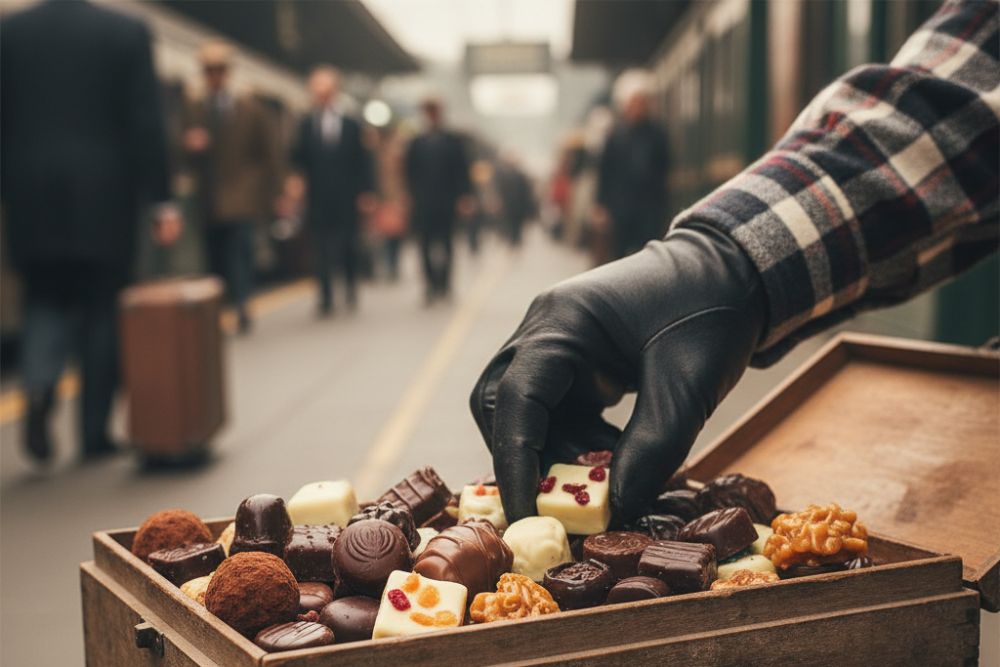
Embracing uncertainty
Uncertainty as a principle of life
It’s funny, isn’t it? We spend so much of our time making plans. We design five-year plans for our careers, plan the next vacation down to the hour, and map out our children’s futures before they’re even in school.
We do this because, deep down, we operate on the assumption that life is a predictable, linear path – a problem to be solved or a project to be managed.
But the truth is, life isn’t a project. It’s a process. And its default setting isn’t order; it’s chaos.
Uncertainty isn’t a poetic idea; it’s the very nature of reality – something that we experience in numerous domains of life.
- 🫀 Health & longevity
Nobody knows the exact timeline or quality of their future health. Today, one may be engaging in conversations with a friend – and tomorrow, a random accident may take that friend’s life.
- 🤝 Relationships
The dynamics and endurance of interpersonal connections are never guaranteed. One may form an intimate bond with another person; and yet, a few years later – when the conditions have changed (e.g. each of them takes a different career path), they may find themselves no longer staying in contact with each other.
- 💼 Economic stability
Job security, market fluctuations, and financial outcomes are always in a state of volatility. Think about how tools like ChatGPT have been completely reshaping the business landscape and labor market. How could one have envisioned such a thing 2-3 years ago?
- 🧠 Cognitive function
Our brains are constantly making decisions under conditions of partial information. We are forced to calculate probabilities, manage risk, and devise flexible strategies rather than relying on fixed outcomes.
- 🔬 Science & knowledge
Even empirical claims and scientific theories are potentially mistaken and subject to revision by further observation. Back in the day, the Geocentric Model (Earth-centered) was the prevailing view for centuries – until it was challenged by the Heliocentric Model (Sun-centered) in the 16th century. And now, it has been found that even the Sun is not the center of the universe. In fact, the Sun is just one of hundreds of billions of stars in our galaxy, the Milky Way – which is a supermassive black hole. And the Milky Way itself is just one of billions of galaxies in the observable universe.
Current cosmological models, based on Einstein’s theory of General Relativity and observations like the Cosmic Microwave Background (CMB), suggest that the universe is expanding uniformly in all directions. In this model, every point in space can be considered the “center” of its own observable region, but there is no single, fixed point from which everything else is expanding.
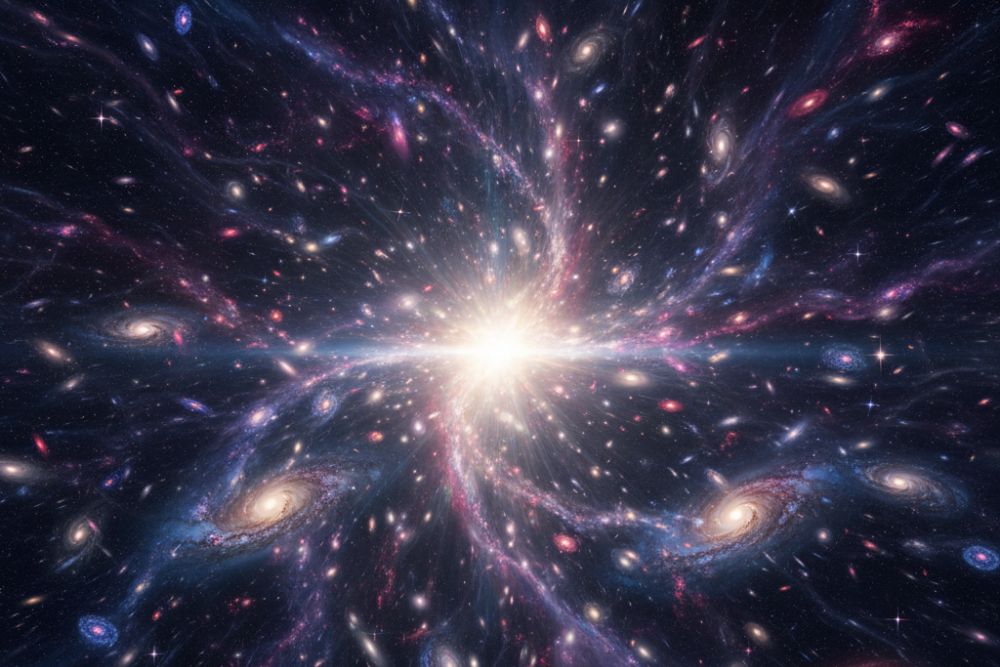
Throughout history, various schools of thought across the world have reflected on the uncertainty of existence. A core pillar of Eastern thought, for instance, is impermanence – the understanding that everything is in a constant state of flux. Our thoughts, feelings, bodies, relationships, the world around us… nothing is fixed. The person you are today is not the one you were yesterday, nor the one you will be tomorrow.
Science has its own versions of this too.
- ⚛️ Probabilistic nature of reality
As concluded by modern physics, reality is not entirely deterministic, meaning that it’s not a pre-programmed, clockwork universe. Quantum mechanics, with principles like the Heisenberg uncertainty principle, shows that even at the level of atoms and particles, there is an irreducible level of randomness and chance. This is not a matter of our limited knowledge – but a fundamental property of the universe.
- 🔢 Statistical mechanics
The world we experience is made up of a staggering number of particles. The behavior of a single gas molecule, for example, is unpredictable, but we can predict the overall behavior of a gas (its pressure and temperature) with statistical certainty. However, the exact state of any individual molecule is always not guaranteed.
- 🦋 Chaos theory
I suppose some of you may have heard of the “butterfly effect” – the idea that a butterfly flapping its wings in Brazil could, through a million tiny, cascading interactions, eventually cause a tornado in Texas.
Our lives are just like that: infinitely complex and interconnected systems. A tiny, seemingly random decision – taking a different route to work, striking up a conversation with a stranger, or for me, deciding to learn Japanese for apparently no logical reason at all – can set in motion a chain of events that changes your entire life course.
The interplay of billions of variables (psychological states, environmental factors, economic trends, other people’s actions – to name a few) makes one’s life trajectory fundamentally unpredictable. Even if we could know all the initial conditions perfectly (which we can’t), the sheer number of interacting factors makes long-term prediction virtually impossible.
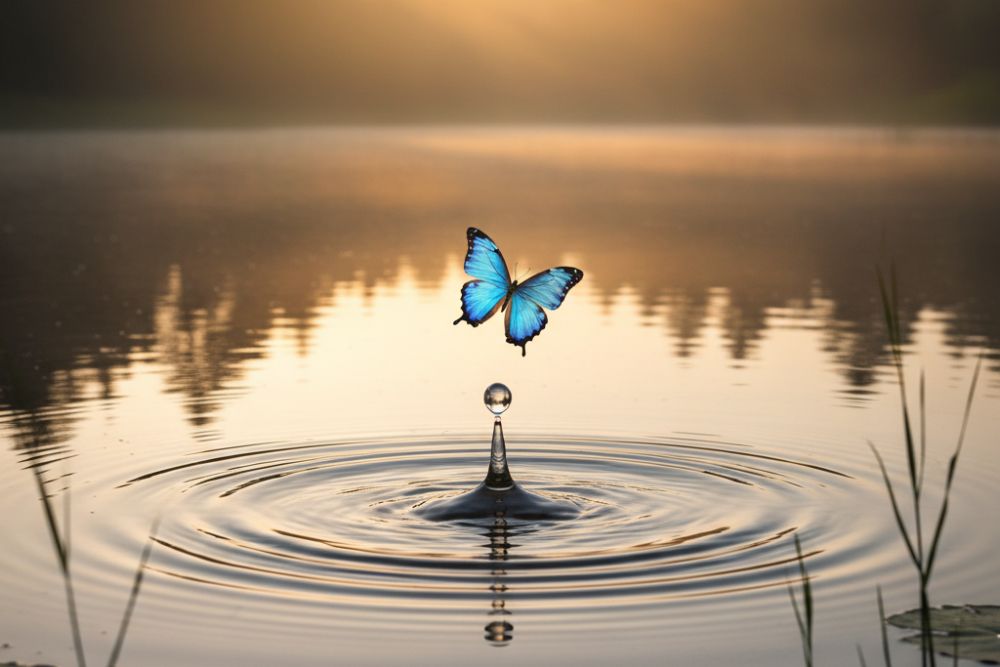
Embracing uncertainty
In this light, it’s not surprising that life feels so uncertain. How could it be anything else?
We’re all, as the famous Indian parable describes, like the blind men touching an elephant. One touches the tusk and says it’s a spear. One touches the leg and says it’s a tree. One touches the tail and says it’s a rope. Each one is convinced that their tiny, partial “truth” is the whole, only truth.

We are just like those men, grasping our one small piece of reality and mistaking it for the whole picture. Is it any wonder we can’t predict what the “elephant” will do next?
Like a feather floating on the breeze, humanity is always subject to the whims of a wind we can’t see or control.
Difficult to see. Always in motion is the future.
Yoda, ‘Star Wars’
Death is the only certainty
Nothing, they say is more certain than death, and nothing more uncertain than the time of dying.
Thomas Paine
This brings us to a grim paradox. We live in a swirling, chaotic sea of impermanence, where everything is in motion, everything is a “maybe”… except for one, single, unchangeable fact.
The only certainty in life is that it ends.
One day, for each of us, we will have to leave everything behind and embark on a journey into the ultimate “unknown”. And as soon as that occurs, there is no turning back. (at least from what is observable)
No matter what happens, one cannot “negotiate” their way out of it. While we can – for sure – delay death with medicine and a healthy lifestyle, the end is inevitable.
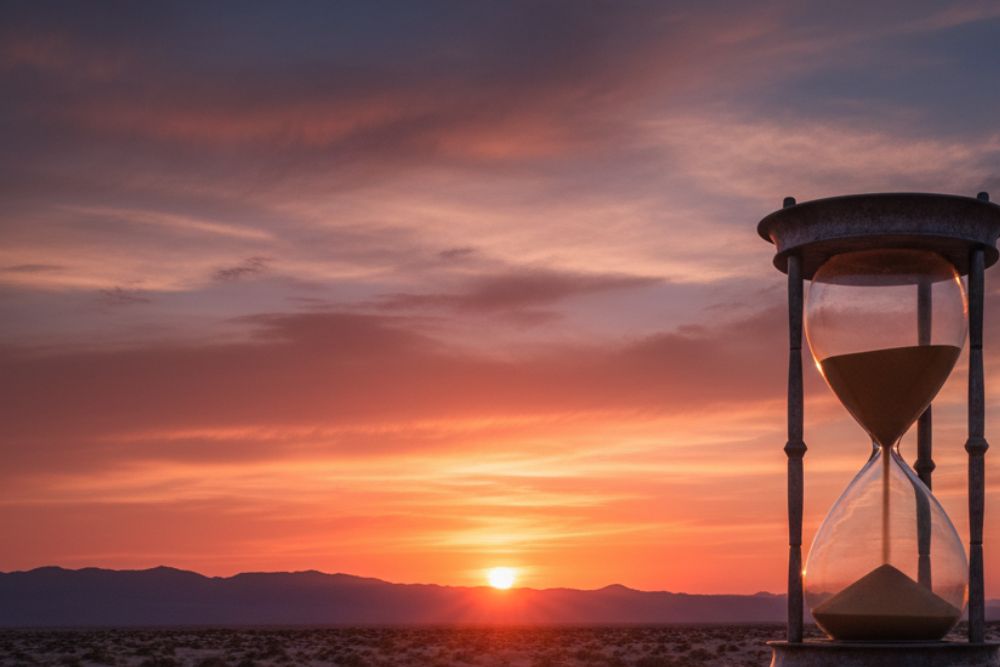
Embracing uncertainty
It’s the one great truth that anchors all the others. As the Buddha has put it:
Life is uncertain; death is certain.
On the surface, it might sound morbid. Yet I’ve come to believe it is the most liberating, motivating, and life-affirming realization we can ever have.
If our time here is the only thing that is finite and guaranteed to run out, how can we possibly afford to stand frozen at the edge of the chasm, paralyzed by the fear of “what if”?
The certainty of death isn’t a curse; it’s a blessing – an alarm bell. It’s the universe shouting in our ear, “Don’t wait! The time is NOW.”
It’s this truth that gives urgency and meaning to our seemingly chaotic existence. And it’s the final push we need to take the leap.
No one knows when their hour will come. As fish are caught in a cruel net, or birds are taken in a snare, so people are trapped by evil times that fall unexpectedly upon them.
Ecclesiastes 9:11-12
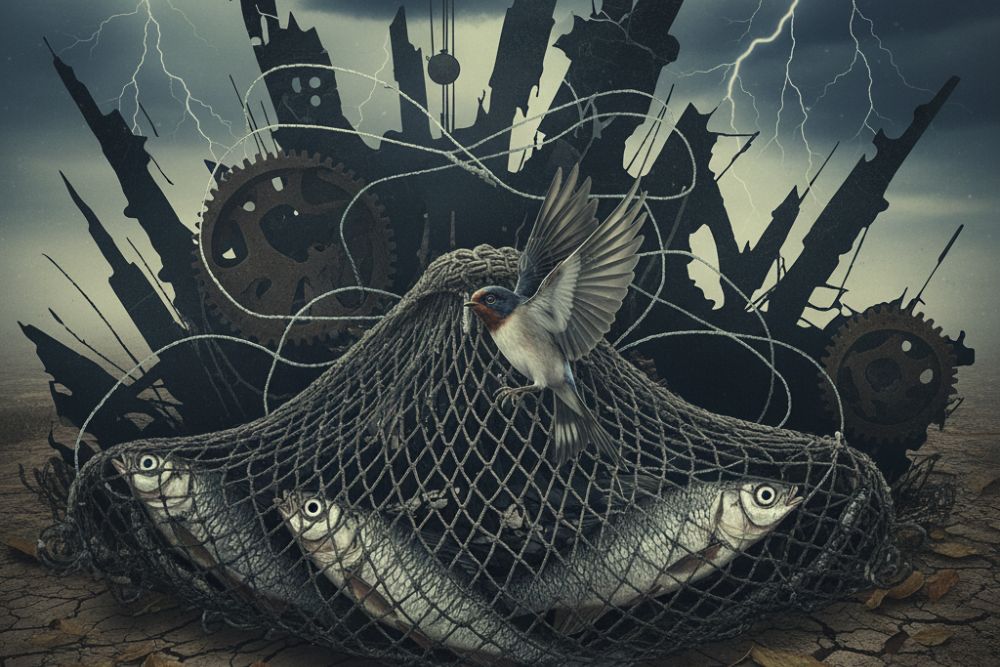
How Humanity Has Been Grappling With Uncertainty
A major theme in philosophy
Uncertainty is an uncomfortable position. But certainty is an absurd one.
Voltaire
When we’re faced with the kind of existential ambiguity we just talked about, it’s natural to go searching for a clue.
Our society, after all, rewards answers. We’re taught from a young age that “I don’t know” is a sign of failure. We want experts to give us the “right” answer, leaders to show us the “right” path, and a clear set of rules to follow.
This craving is deeply human and completely understandable. And yet, I’ve found that clinging to it too tightly tends to do more harm than good.
When we need the map – the one right answer – we become rigid. We treat “I don’t know” as a threat to be eliminated, not an invitation to learn.
We start looking for information that simply confirms what we already believe, and we shut ourselves off from anything, or anyone, that challenges our pre-drawn world.
We end up with a fragile “certainty”, and it makes us terrified of the very complexity we claim to have solved.
This, for me, is where the true value of philosophy comes in.
Philosophy’s greatest gift isn’t that it gives us a better “map”. Rather, it gives us the courage to ask better questions – and to live without needing a map at all. It is, in its purest form, the practice of being comfortable with “I don’t know.”
To teach how to live without certainty, and yet without being paralyzed by hesitation, is perhaps the chief thing that philosophy, in our age, can still do for those who study it.
Bertrand Russell
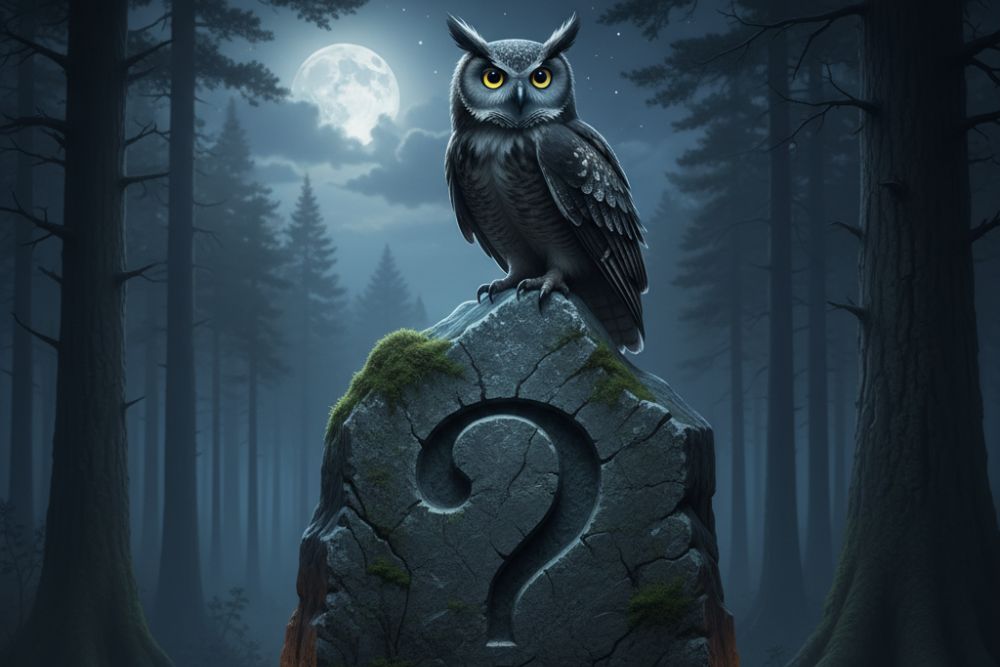
Uncertainty symbol
This tradition of intellectual humility dates back centuries. It began with the philosopher Socrates, who, after a lifetime of questioning the wisest men in Athens, came to a famous conclusion:
All I know is that I know nothing.
True wisdom, as Socrates realized, isn’t about having a head full of facts. It’s about having the humility to recognize the staggering, infinite-ocean-vastness of one’s own ignorance. That admission is the necessary first step to any real learning.
Thousands of years later, the idea found a new voice within the existentialists – both secular and religious. Despite the differences in approach, they all shared a focus on the individual, grappling with freedom, responsibility, and the anxiety of the unknown. Thinkers like Jean-Paul Sartre argued that we are “condemned to be free.” With no pre-ordained destiny or divine script, we are completely responsible for creating our own meaning through our choices.
This emphasis on the individual’s uncertain path wasn’t just for the secular-minded. The Christian philosopher Søren Kierkegaard argued that true faith wasn’t found in the comfortable, objective “certainty” of state-run church dogma. For him, it started from a passionate “leap of faith” – a subjective decision made not with objective proof, but in the face of uncertainty.
What unites these thinkers is the conclusion that life’s meaning isn’t found “out there” in a universal map, but “in here” – in the choices we must make for ourselves.
At the point where the road swings off (and where that is cannot be stated objectively, since it is precisely subjectivity), objective knowledge is suspended. Objectively he then has only uncertainty, but this is precisely what intensifies the infinite passion of inwardness, and truth is precisely the daring venture of choosing the objective uncertainty with the passion of the infinite.
Søren Kierkegaard
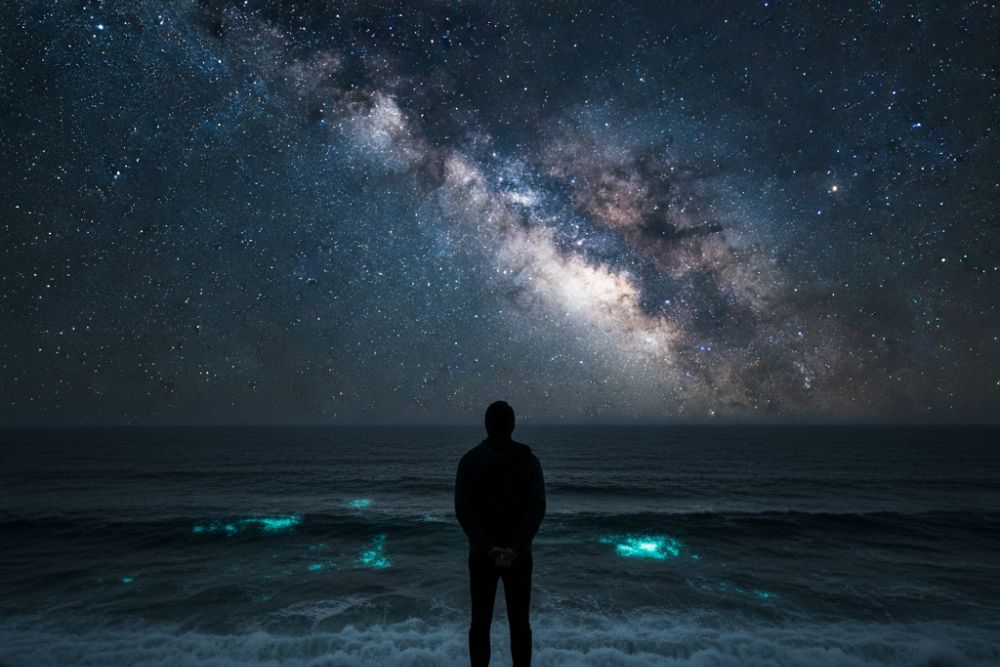
Embracing uncertainty
Religion vs philosophy’s stance on uncertainty
It is the search for the truth, not possession of the truth which is the way of philosophy. Its questions are more relevant than its answers, and every answer becomes a new question.
Karl Jaspers
The promotion of personal experience over rigid, external doctrine is precisely where I’ve often felt a tension between philosophy and some forms of organized religion. From my own perspective, religion tends to – understandably – appeal to a general audience by providing a fixed framework. It offers comfort and answers to our biggest fears (i.e. “What is my purpose? What happens when I die?”, etc.) through sacred texts, parables, moral rules, and the promise of salvation/ liberation.
As someone with a Christian background who also resonates with Eastern thought (like Buddhism and Taoism), I truly value the community and moral compass that religion provides. At the same time, I’m also wary of how, in an attempt to appeal to the masses, its message is, many times, oversimplified. That it sometimes promotes a “fake certainty” that feels incompatible with the complex and nuanced reality of the world.
Of course, this isn’t the whole story. To be fair, many religious thinkers – think of Christian mystics like Thomas Merton or Francis of Assisi, or Sufi poets like Rumi – have always argued that the deepest faith is found precisely in this ‘cloud of unknowing,’ in a direct, personal experience of the divine that transcends any human-made rule.
Still, the mainstream approach often contrasts with philosophy, which is the very practice of questioning those ‘absolute truths’ – and being willing to sit in the discomfort of the unknown.
Nothing so tends to mask the face of God as religion; it can be a substitute for God himself.
Martin Buber
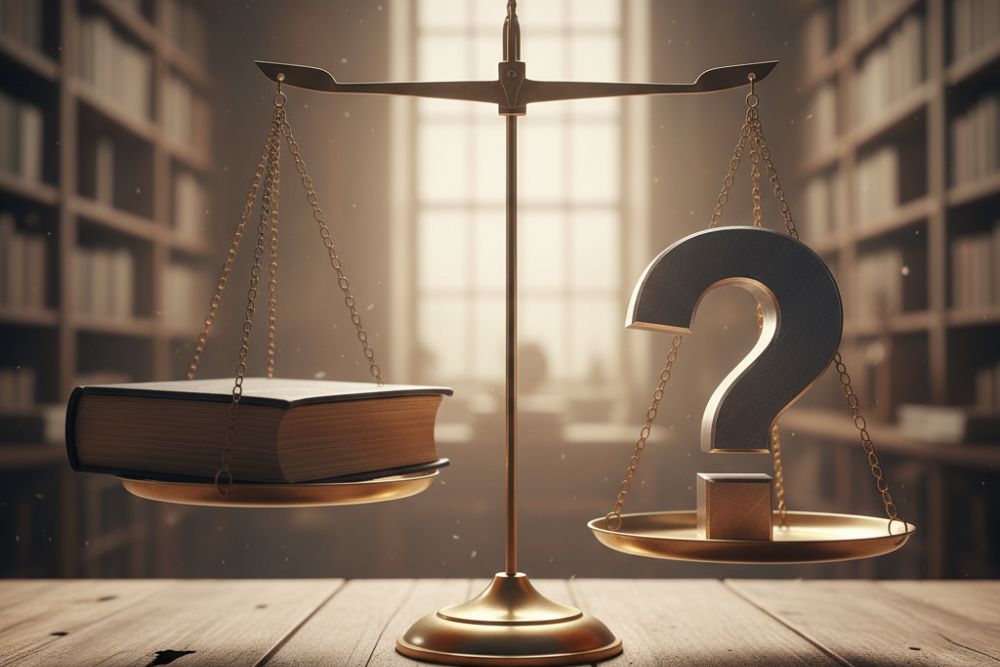
Speaking of which, I remember once coming across this story about the Dalai Lama. The scientist Carl Sagan once asked him what he would do if science definitively disproved reincarnation, a core tenet of his faith.
And you know what?
The Dalai Lama replied – without hesitation – that if science could disprove reincarnation, “Tibetan Buddhism would abandon reincarnation.” (He did add, with a smile, “…but it’s going to be mighty hard to disprove reincarnation.“)
I have always found it amusing for the Dalai Lama to say something like that about an essential tenet of his belief. If it is true (that reincarnation is not real at all), then not only will the foundation of Buddhism be shaken to its core – but also his status as the worthy successor of the previous Lama will be destroyed.
At the same time, I cannot help but feel that there is something much deeper behind his answer.
Just think about that for a moment. That isn’t the voice of blind dogma. It’s the voice of intellectual courage – of a commitment to truth, wherever it may lead, over the comfort of any single, pre-existing belief.
What the Dalai Lama demonstrated through his response is that the goal of any great spiritual or philosophical path isn’t to blindly protect the path itself (the ‘ism,’ the dogma). It is something far more worthwhile: the cultivation of wisdom and the practice of compassion.
These are the real ‘destinations.’ Whether our vehicle is Buddhism, Christianity, or secular humanism, the point is not to worship the vehicle, but to arrive at a place of enlightenment.
In the end, we have to choose. We can decide to live in a small, walled garden of comforting ‘facts,’ or we can choose to be the kind of person who is courageous enough to explore the wilderness of reality.
I am a finger pointing to the moon. Don’t look at me; look at the moon.
Buddha
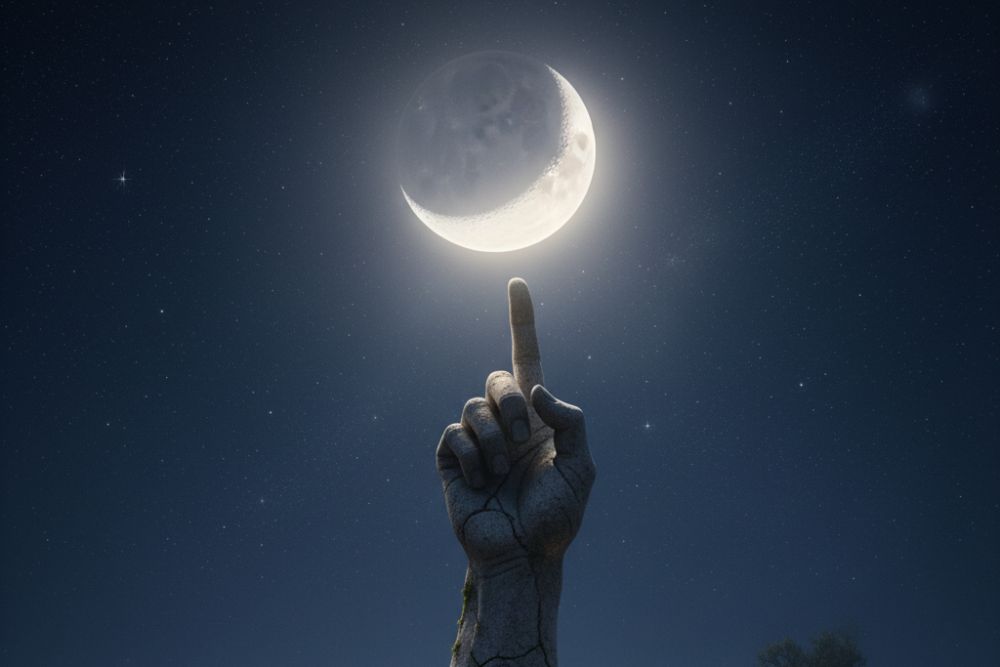
Why Are We Afraid of Uncertainty?
The obscurity of the external world is a function of my own obscurity to myself; the world has no intrinsic obscurity.
Gabriel Marcel
It’s a beautiful idea, isn’t it? To be courageous, to explore the wilderness of reality, to seek truth over dogma.
But let’s be honest: it’s incredibly hard.
If embracing uncertainty is a wise decision, why does it feel so viscerally bad? Why do we instinctively run toward the comfort of a walled garden, even when we know it can become a cage that traps us from moving forward?

Embracing uncertainty
Biological mechanism
I believe the answer isn’t that we’re weak or foolish. It’s that we’re human, and we are hardwired for survival.
Our brains, after all, didn’t evolve to seek cosmic truth; they evolved to keep us alive. For our ancestors roaming the savanna, uncertainty was lethal.
A rustle in the bushes wasn’t a philosophical mystery; it was a potential predator.
An unfamiliar berry wasn’t an “opportunity for growth”; it could be poison.
Our minds became masterful “prediction machines,” brilliant at spotting patterns and creating order from chaos. When a situation is clear and predictable (“this berry is safe”), our brain gives us a little reward. But when things are uncertain (“I don’t know what’s in those bushes”), it slams the biological alarm bell.
That feeling of anxiety in the pit of your stomach? That’s not a personal failure; it’s an inherent survival mechanism. It’s your body screaming, “Danger! Do something! Find a certain answer, now!”
This ancient wiring gets amplified by our modern psychology. We all have a deep-seated need for what psychologists call “cognitive closure” – that click in the brain when a question is finally answered, and the “distress of the unknown” goes away.
We are just not comfortable sitting in the gray areas of life. That’s why we look for patterns, set up rules, demand promises, and resort to mechanisms like commitments/ KPIs to create a feeling of agency – which, as scientific and psychological discoveries have found out, is essential for our well-being and motivation.

Fear of failure
And there’s more to it. We aren’t just afraid of the unknown; we’re terrified of failing. We’re afraid of wasting our time – that one, single, finite resource we talked about earlier.
We want a guarantee. We want to know that if we pour our heart, money, and years into a project, a relationship, or a new career, it will work out. The idea that we could give it our all and end up with nothing to show for it feels… well, unfair.
We are willing to pay the price when there’s a high probability that our efforts will achieve success, far less eager when the probability is low. We want certainty that our effort and sacrifice will not be in vain. We are terrorized by the prospect of putting everything we have into achieving a goal and ending up with nothing to show for it. Total commitment shouldn’t be a futile gesture, we think. It’s not fair. So we avoid paying that price. No commitment, no futility.
Marshall Goldsmith, ‘The Earned Life’
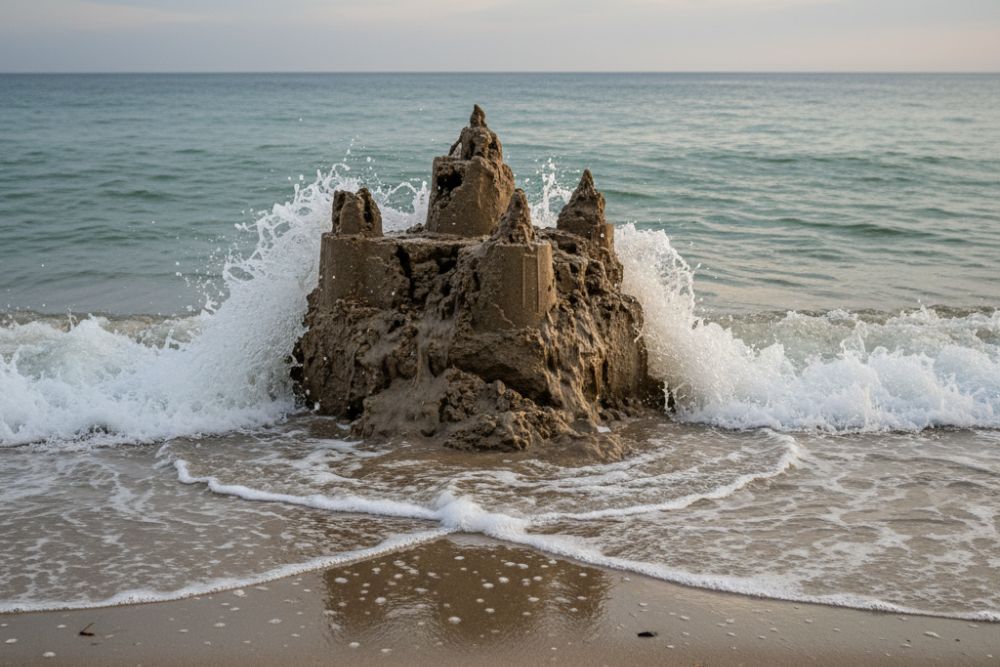
Modern culture
The above-mentioned fear is further reinforced by the very world we’ve established. Our entire culture is a giant machine designed to sell us certainty.
We’re taught to have a “5-year plan.” We’re sold what Dr. Goldsmith refers to as the “Great Western Disease“: the pervasive, toxic belief of “I’ll be happy when…”
- “…when I get the promotion.”
- “…when I buy the house.”
- “…when I find the one.”
It’s a life built on the fantasy of a linear, predictable path to a “happily ever after” that, as we all know, never quite arrives.
Our society rewards people who have answers, not those who have questions. We’ve been conditioned to equate “knowing” with success and “not knowing” with incompetence.
So we pretend to be more certain than we really are. We nod along in meetings, we give firm answers when we’re just guessing, and we scroll through social media looking at everyone else’s curated, “certain” lives, all while feeling our own private anxiety grow.
We end up trying to grip our lives with white knuckles, desperate to steer everything in the “right” direction, which only makes us more anxious.
Our anxiety does not come from thinking about the future, but from wanting to control it.
Kahlil Gibran
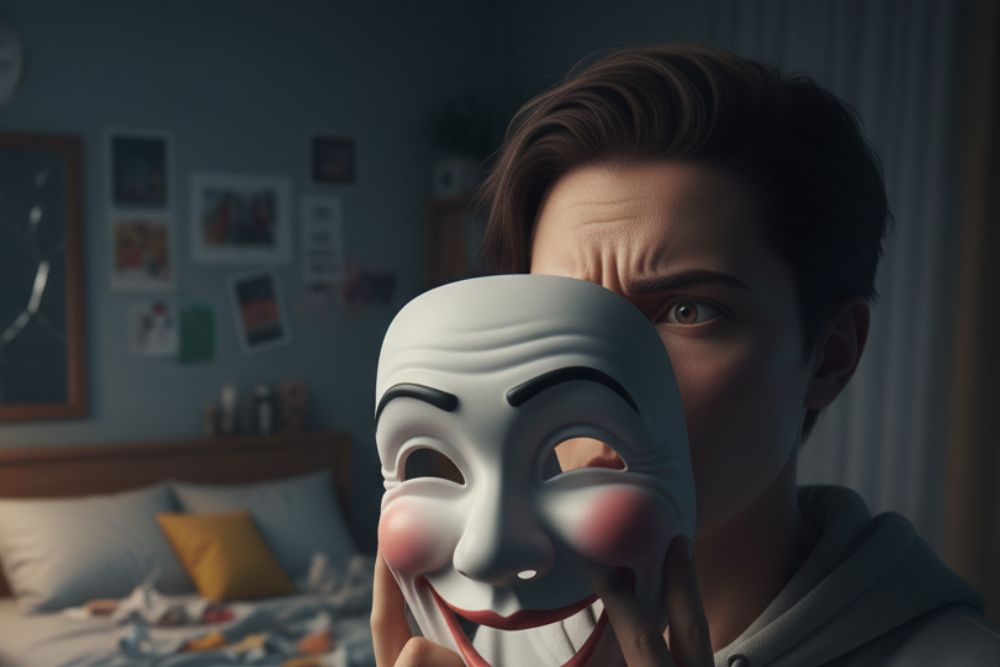
To wrap it up, it’s a combination of our biology, psychology, and modern society that makes us fear the very thing we need to embrace. More than a personal failing, it’s the default human condition.
Being able to acknowledge that – to see the fear for what it is – is the first step to moving through it.
Why Embracing Uncertainty?
If life were predictable it would cease to be life, and be without flavor.
Eleanor Roosevelt
Given that uncertainty is an unavoidable part of existence (as we have discussed so far), it’s obvious that we have no choice but to confront it. Not with disgust or contempt, but with acceptance.
Why? Some may ask.
Simple – because such an attitude is the key to abundance.
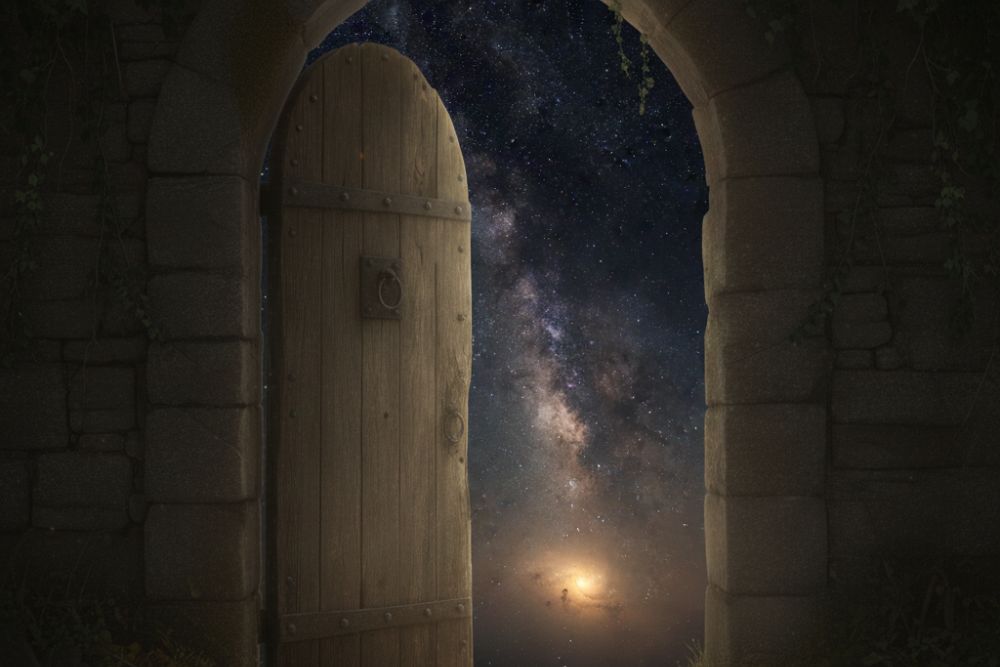
Embracing uncertainty
It cultivates resilience & growth
The ultimate measure of a man is not where he stands in moments of comfort and convenience, but where he stands at times of challenge and controversy.
Martin Luther King Jr.
A life built on the expectation of certainty is a fragile life. It’s just like a “house built on sand” – looking solid and secure, but the moment an unexpected storm hits (e.g. a job loss, a health crisis, a relationship ending, etc.), the entire structure collapses.
On the other hand, a life that accepts uncertainty as the norm is a resilient one, like a “house built on the rock.”
Just think back to any period of profound personal growth in your life. I can guarantee it wasn’t a time when everything was easy and going according to plan.
When I took my own leap from a stable career, those first months were terrifying. But that period forced me to improvise, to learn new skills, to adopt new habits (e.g. cooking instead of eating out too much; practicing mindful spending instead of just buying a coffee/ snack out of impulse), and to discover a strength I never knew I had.
We don’t grow when we’re comfortable. It is when the map we’re holding becomes useless that we are forced to be creative and adaptable. And from then, real growth may begin.
As psychological studies have shown, “uncertainty tolerance” isn’t just a nice-to-have; it’s a powerful protective factor for our mental health. On the other hand, the more we try to control every variable, the more stressed and exhausted we become.
The quality of your life is directly related to how much uncertainty you can comfortably handle.
Tony Robbins
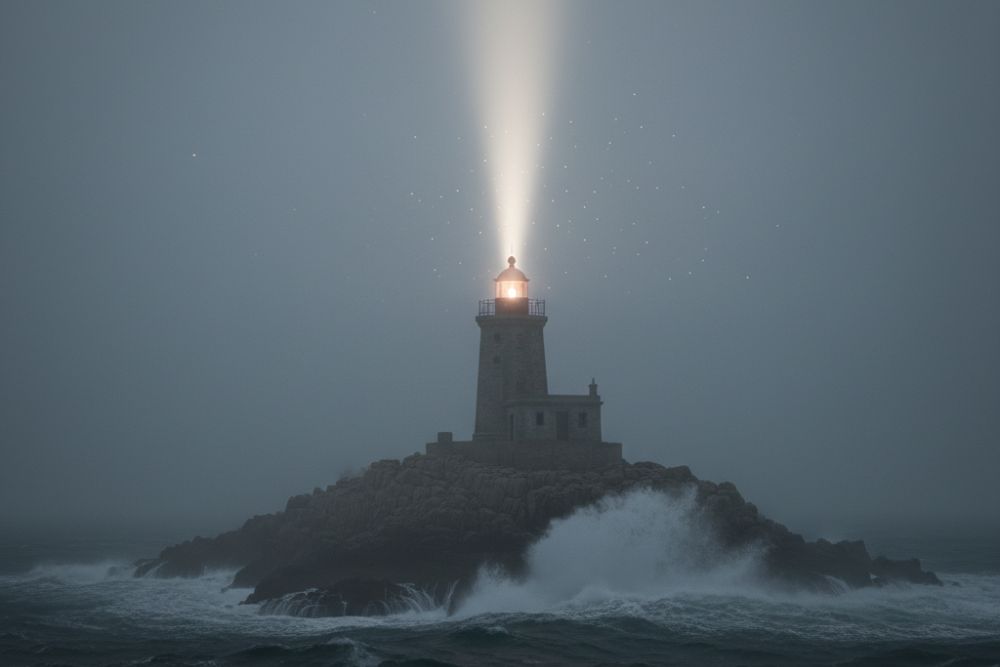
Embracing uncertainty
It opens the door to opportunity
If you could see your whole life from start to finish, would you change things?
Louise Banks, ‘Arrival’ (2016)
It’s a fascinating question, isn’t it? At first, knowing the whole script might sound like a relief. But after a while… wouldn’t it just become boring?
This makes me think back about playing video games as a kid. Long before the Internet and Google, I’d get hopelessly stuck at certain points in a game, unable to move forward. I had no choice but to figure it out myself – wandering the same corridors, trying every item, mashing every button.
It was tiring, and yet, it was exciting.
Then the Internet became popular. Suddenly, I could search for guides, read the whole storyline before I even began, and even use “cheat codes.” At first, this felt incredible, like I’d become a mini-god. I could solve any riddle instantly and beat any opponent as if they were a joke.
But after a while… the games just became plain boring. The magic was gone. I was no longer an adventurer on a journey; I was just an accumulator of achievements, a robot checking off a list.
This is the very trap of craving certainty in life. We trade the thrill of the adventure for the boredom of the outcome.
We think we want the cheat codes, but what we really crave is the quest itself.
It’s the possibility of having a dream come true that makes life interesting.
Paulo Coelho
And what’s more, the more we focus on one specific outcome or path, the more we close off other possibilities. For instance, if you dedicate your life to a highly specialized career, you might achieve great success in that field. At the same time, you lose the opportunity to explore other passions and cultivate different skills.
When we rigidly stick to a plan, we deny the random encounters or lucky breaks that, many times, lead to new friendships, job opportunities, or growth. In this sense, the pursuit of “certainty” only gives rise to an “uncertainty” in discovering new possibilities.

Embracing change and uncertainty in personal development
It fosters learning & connection
Usually when we hear or read something new, we just compare it to our own ideas. If it is the same, we accept it… If it is not, we say it is incorrect. In either case, we learn nothing.
Thich Nhat Hanh
Clinging to certainty doesn’t just make our lives smaller; it makes our minds smaller. When we’re convinced we already have the “right” answers, we stop listening. We seal ourselves off in an echo chamber, where the only validation we get is from our own pre-approved ideas.
It’s a deeply stagnant and lonely place, and it makes genuine connection impossible.
Embracing uncertainty, on the other hand, is the antidote to this. It’s the humility of Socrates (“I know nothing”) that makes us genuinely curious.
We stop comparing and start listening. We lean in. We ask questions.
This allows for what’s known as “good conflict.” The goal is no longer to win the argument, but to understand. We can explore the gray area together.
Think of a tense political chat with a family member. The “certain” approach is to list all the reasons they’re wrong. The “uncertain” approach, on the other hand, is to humbly ask, “Please help me understand why you feel so strongly about this.“
That one simple shift, as I’m sure many of us have experienced, may be just the difference between a shouting match and a moment of truth and intimacy.
Certainty is the great enemy of unity. Certainty is the deadly enemy of tolerance.
Robert Harris, ‘Conclave’

Read more: Asking for Help – The Power That Comes From Vulnerability
It fuels creativity & progress
If we knew what it was we were doing, it would not be called research, would it?
Albert Einstein
Creativity, by its very definition, is a journey into the unknown. It’s the act of bringing something new into existence, and “new” implies “not yet known.”
Certainty, on the other hand, is the realm of repetition. It’s following a known recipe, filling in a template, or executing a proven plan. While useful for efficiency, it can never produce something truly original.
Think of it this way: a “paint-by-numbers” kit offers you complete certainty. You know exactly what the outcome will be, and you are guaranteed a “correct” result. But you are not creating; you are copying.
An artist facing a blank canvas operates in pure uncertainty. They don’t know if the final piece will “work.” They have to experiment, take risks, follow a vague intuition, and be willing to fail – to paint over their own mistakes. Only then may true art be born.
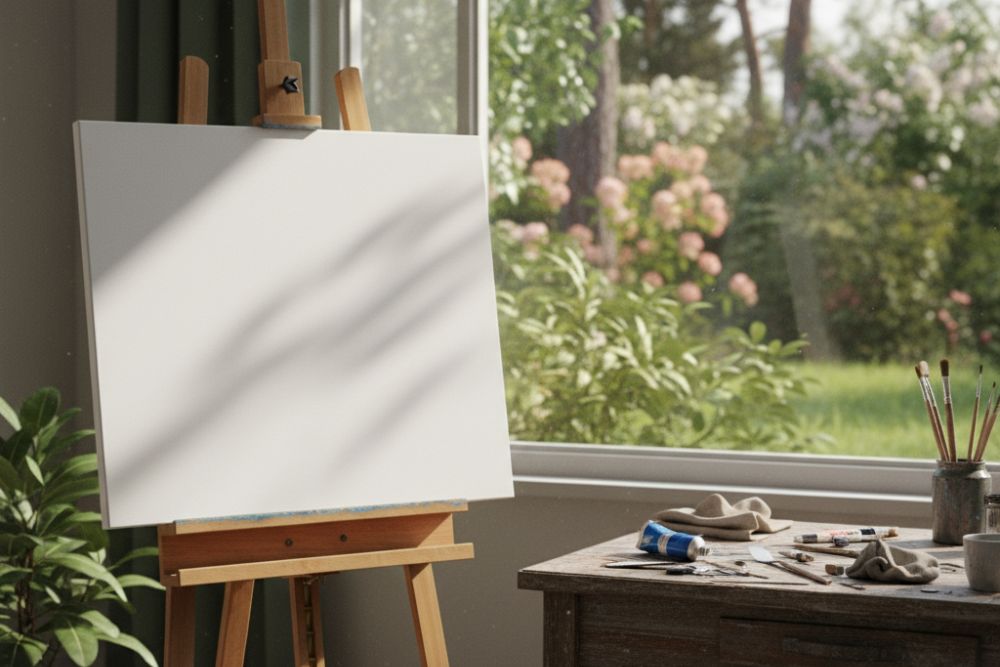
Embracing uncertainty
The same principle applies to all human progress. Major breakthroughs don’t come from following a guaranteed, step-by-step manual. They happen when someone is bold enough to ask, “What if…?” and step off the map, away from the “right” answers.
When early scientists asked, “What is light?” they didn’t have a guaranteed answer or a clear use for the knowledge. They were driven by pure curiosity.
The alchemists’ quest to turn lead into gold, while “wrong” in its premise, was what laid the foundations for modern chemistry.
Explorers like Columbus and Magellan sailed off the known map, not with a guarantee of arrival, but with a hypothesis and a profound tolerance for ambiguity.
These leaps – in art, science, and exploration – are all leaps of faith. They are fueled by an acceptance that the outcome is not guaranteed. Without it, innovation would be impossible, and humanity would simply be repeating its past.
While most of us may never find ourselves in the same situation as Columbus or Magellan, we do have to make a lot of big decisions in life. Should I take this career path? Should I move to a new country? Should I get married?
No amount of data can give you a certain answer. No spreadsheet can calculate who you will become after you make the choice.
You just have to let go of the “facts” and take a leap based on your values, intuition, and belief in your own ability to handle what comes next.
The future is uncertain… but this uncertainty is at the very heart of human creativity.
Ilya Prigogine
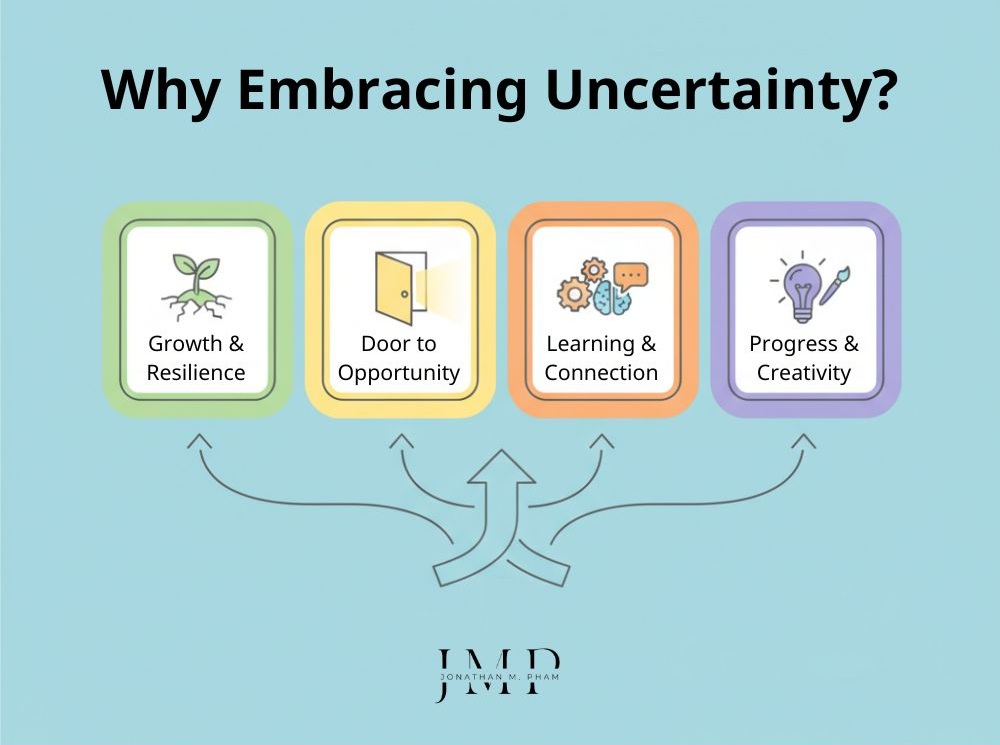
Embracing uncertainty
Is Embracing Uncertainty Nihilistic?
Those who begin with certainty end up in uncertainty. Those who begin with uncertainty, questioning, asking, doubting, probing, those end up with absolute certainty, not relative certainty.
Jiddu Krishnamurti
I suppose this is what some of you might be thinking at this point.
All of our discussions so far seem very nice, but if we let go of all certainty, where does it end?
If there’s no fixed map, no guaranteed “right” way, doesn’t that just lead to chaos?
If there’s no ultimate, objective meaning, doesn’t that mean nothing matters?
It’s the deep, gnawing fear captured in Dostoevsky’s famous line:
If God does not exist, everything would be permitted.
It’s the fear of the ultimate slippery slope, the one that ends in nihilism – the belief that life is completely meaningless.
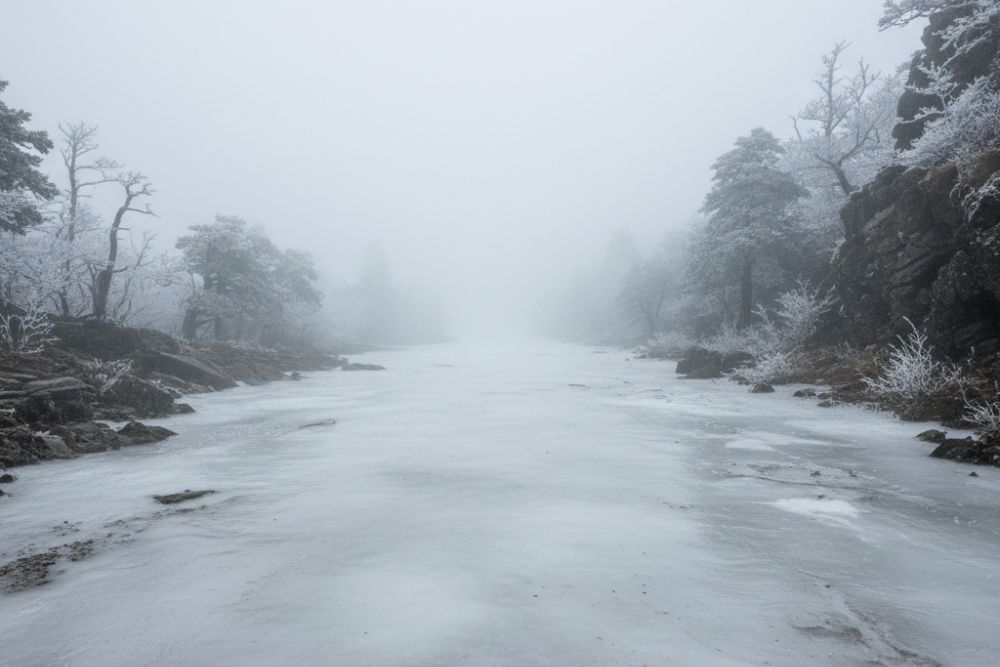
Existential uncertainty
I have wrestled with this troubling idea a lot on my own journey. And eventually, I’ve come to believe that this line of thinking gets it exactly backward.
Embracing uncertainty isn’t a sign of nihilism; it’s the ultimate act of humility. Clinging to a rigid, unproven certainty that you and your group have the one and only truth… that is the real arrogance.
It’s the mindset of the “frog in the well,” who mistakes his tiny circle of water for the entire ocean. When we’re so certain of our own little map, we become intellectually and spiritually blind.
Speaking of which, I’m reminded of something I experienced as a kid. One day during Sunday mass, the priest decided to “disprove” evolution and reincarnation. His arguments were, essentially:
- On evolution: “If it’s true, just bring an ape home and domesticate it. It will eventually become human.”
- On reincarnation: “If it’s true, how can the human population keep rising?”
Even as a kid, knowing little about either topic, I felt a deep discomfort. It felt… too simple.
And I realized later, it’s because these are classic rhetorical tricks. They’re designed to shut down inquiry, not invite it.
They are perfect examples of creating “fake certainty”. Of simplifying things to something like “Four legs good, two legs bad”.
The first argument ridiculously misunderstands the scale of time (millions of years, not a single lifetime) as proposed by evolutionists. And the second one falsely assumes that rebirth is a closed human system, ignoring the vast, multi-realm cosmology of Eastern thought.
In both cases, a massive, complex, and non-intuitive truth was replaced with a simple “common-sense” straw man that could be easily knocked down.
This is what intellectual cowardice looks like. It’s the “frog” willfully limiting the scale of the universe – be it the scale of time or of existence – to what is immediately comfortable. It’s choosing the comfort of a simple lie over the challenge of a complex truth.
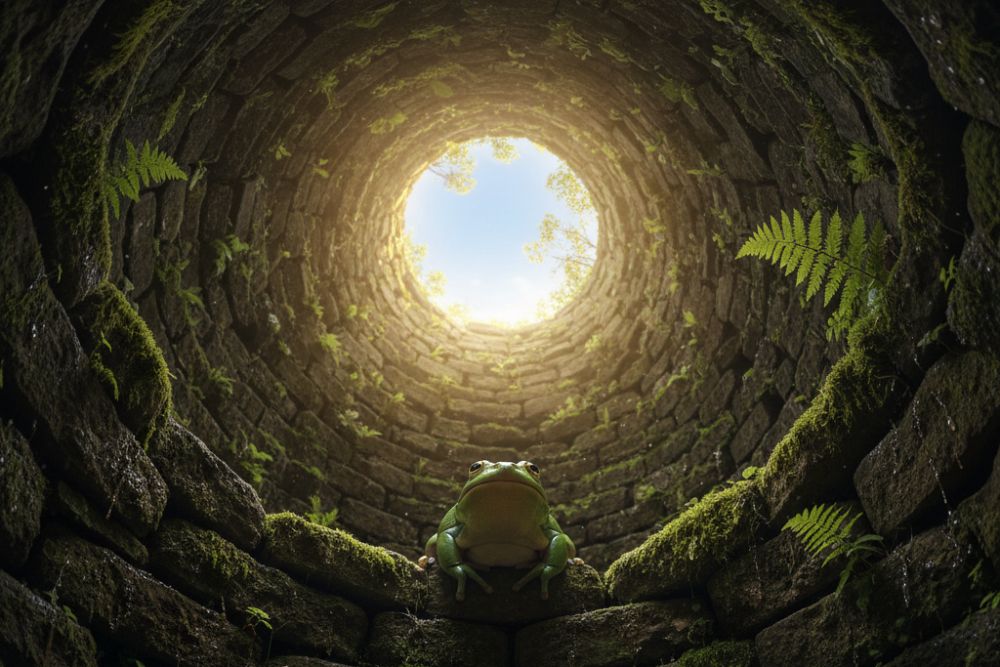
The philosopher Immanuel Kant once proposed a name for this fundamental human limit. He argued that we can only ever know the phenomena – the world as it appears to us through our senses. We can never, he said, grasp the noumena – the ‘thing-in-itself,’ or the Ultimate Reality.
We are the ‘frog,’ and the ocean is the ‘noumena.’
Embracing uncertainty, then, is being honest enough to accept this limit. It’s knowing that reality is often non-intuitive – and that the truth is rarely simple. It’s the willingness to hold two opposing ideas in your mind at the same time without needing to destroy one of them.
The opposite of a true statement is a false statement, but the opposite of a profound truth is usually another profound truth.
Niels Bohr
I suppose we can solidify our discussions so far by reflecting on the Buddha’s Parable of the Poisoned Arrow. The story goes like this: A man is shot with a poisoned arrow. The doctor rushes to help, but the man refuses treatment. He won’t let the doctor pull the arrow out until he knows the archer’s name, his caste, the type of bow used, and what kind of feathers were on the arrow.
What happens?
The man dies, of course. He dies while demanding certainty.
The Buddha’s point is this: We are all that man. We are all walking around, wounded by the “arrow” of human suffering. And yet, we get caught up in endless ideological debates – whether they concern religion, politics, mindset, culture, or else.
What really matters is to acknowledge that we don’t know the archer’s name, and that’s okay. Our urgent, practical, and certain task is to simply pull out the arrow – to end our own miseries and help those around us end theirs.
In other words, it’s about embracing uncertainty – and acting even when we do not fully know everything yet.
This isn’t nihilism. Quite the opposite. It’s a call to action.
It’s a philosophy that grounds us in the here and now, in the service of others. And its spirit – prioritizing compassionate action over rigid, abstract “correctness” – is reflected in other spiritual traditions as well.
If you had known what these words mean, “I desire mercy, not sacrifice,” you would not have condemned the innocent… Which of you, if his sheep falls into a pit on the Sabbath, will not take hold of it and lift it out? How much more valuable is a person than a sheep!
Matthew 12:7-12
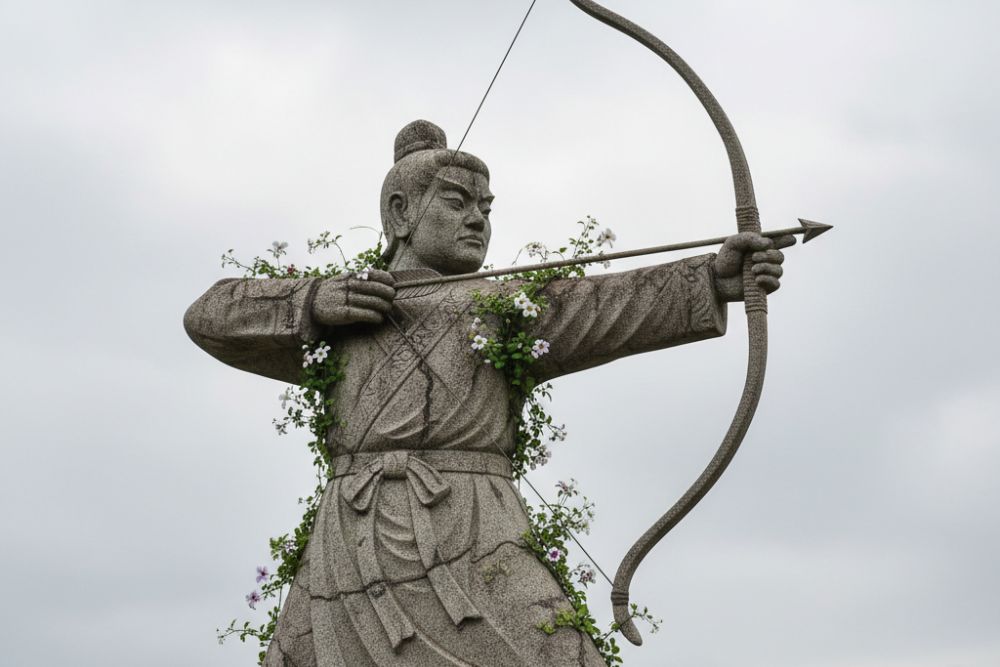
In life (not just theology), we can also apply the same principle. For instance, think of the current climate crisis. As a planet, we are “shot” with the poisoned arrow of environmental change. And yet, how much time have we wasted on “unproductive speculation”? How many times have we argued over the precise percentages of its cause (“Is it natural cycles or human activity?”) or whether we should wait for a “technological magic bullet” to fix everything?
These are the man’s questions to the doctor. Embracing uncertainty here means doing what we can right now – reducing emissions, investing in what works, and (on a personal level) adopting a greener lifestyle (e.g. stop using plastic bags, going out to eat instead of ordering food online, etc.)
It’s the same with our personal health. When we get a shocking diagnosis, it’s so easy to get lost in the paralyzing “Why?” (“Why me? Is it my genes? My past lifestyle? My karma?”). But these are the unanswerable questions.
The priority – the “constructive action” – is to stick to the treatment plan, change our diet, and focus on the next, practical step toward well-being.
It doesn’t matter if there is an ultimate meaning behind everything we do. Whether left wing or right wing/ capitalism or socialism/ religion or atheism is correct. Whether there is a God or not – and if there is one, what kind of nature God has.
After all, would God really care if we are right about God or not? Would God be appeased by us boasting about our own self-righteousness – or by us admitting our own limits and trying to live virtuously?
I suppose one should be able to come up with an answer on their own. My take is simple: “Who exalts himself will be humbled, and who humbles himself will be exalted“.
Live a good life. If there are gods and they are just, then they will not care how devout you have been, but will welcome you based on the virtues you have lived by. If there are gods, but unjust, then you should not want to worship them. If there are no gods, then you will be gone, but will have lived a noble life that will live on in the memories of your loved ones.
Anonymous (sometimes attributed to Marcus Aurelius)

What Does It Mean to Embrace Uncertainty?
Life is full of surprises. When your day is wonderful, cherish it. When it becomes difficult, stay strong.
Roger Lee
It’s easy to talk about “leaps of faith” and “pulling out arrows,” but how does the idea of embracing uncertainty change the way we make decisions on a Tuesday morning?
I’m not saying that you should be reckless or suddenly have no plan at all. For me, what’s important is to undergo a series of quiet, internal shifts in perspective.
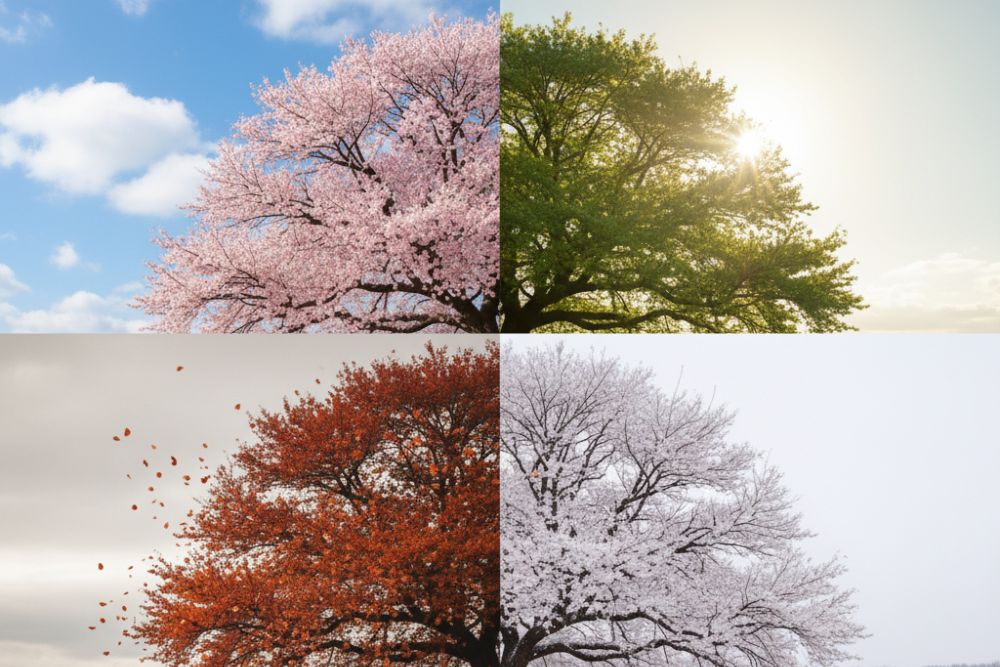
Embracing uncertainty
From outcome to process
I’m sure many of you know this exchange from Alice in Wonderland. Alice, lost, asks the Cheshire Cat:
“Would you tell me, please, which way I ought to go from here?”
“That depends a good deal on where you want to get to,” said the Cat.
“I don’t much care where—” said Alice.
“Then it doesn’t matter which way you go,” said the Cat.
I’ve seen this scene used in so many self-help books to scold people for not having a specific 5-year plan. “See!” they say, “If you don’t have a goal, you’ll end up nowhere!”
But I think that interpretation misses the real wisdom. The conversation doesn’t end there. Alice clarifies, “—so long as I get SOMEWHERE,” and the Cat replies,
“Oh, you’re sure to do that, if only you walk long enough.”
That, for me, is the whole secret.

Embracing uncertainty means shifting your focus from the destination to the journey. To finding satisfaction in the effort itself – in the process of learning, striving, and showing up each day.
It’s the writer who stops obsessing over getting published and instead finds satisfaction in the daily act of just writing.
It’s the person cultivating a new skill – like me with Japanese – who lets go of “when will I be fluent?” and instead learns to love the clumsy, yet joyful process of forming a new sentence.
It’s focusing on the effort, not the guaranteed result.
It’s trusting that if you “walk long enough” with intention and curiosity, you will get somewhere meaningful – even if it’s not the destination you originally had on the map.
If you can make the process of making the effort your primary source of happiness, then you have succeeded in the most important challenge of your life.
Ken Mogi
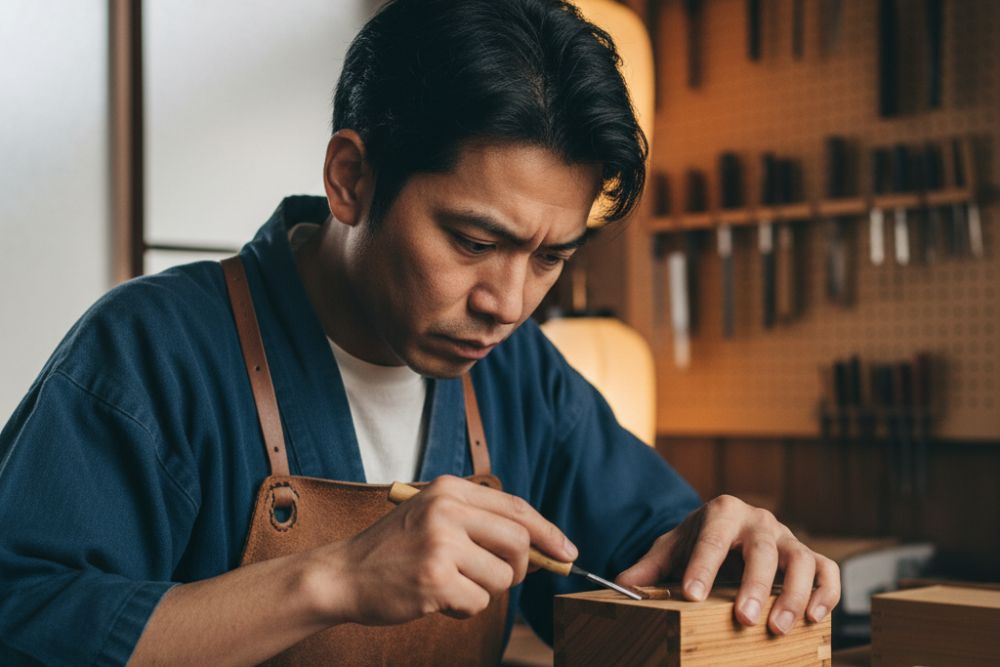
From control to influence
I don’t know why one person gets sick, and another does not, but I can only assume that some natural laws which we don’t understand are at work.
Harold Kushner
I remember back in the day watching the movie Kungfu Panda. The story centers on Master Shifu, a rigid, disciplined teacher, and Oogway, the ancient, wise tortoise. Shifu’s former student, the evil Tai Lung, is prophesied to escape prison one day. As such, Shifu panics and desperately searches for the “Dragon Warrior,” a hero he believes must be a perfect, traditional warrior.
And yet, what he discovers is… Po, a bumbling panda.
Shifu becomes so disillusioned that he treats Po with utter disgust and contempt. He does everything in his power to make Po quit, stubbornly clinging to his idea of what the Dragon Warrior must be – and refusing to see Po for what he is.
Then one day, the prophecy does come true: Tai Lung escapes from his prison. As soon as he knows that, Shifu, in a panic, rushes to Oogway:
Shifu: Master! I have… it’s very bad news!
Oogway: Ah, Shifu. There is just news. There is no good or bad.
Shifu: Master, your vision. Your vision was right! Tai Lung has broken out of prison! He’s on his way!
Oogway: That IS bad news.

Back in the day, I found Oogway’s response quite absurd – like, he contradicts what he has just said! And yet, now that I have known more, I realize that one should not take the conversation that lightly.
If we interpret it based on the teachings of traditions like Taoism and Buddhism, we will see that Oogway first speaks from the Absolute perspective (events are just events; there is no ‘good’ or ‘bad’). But when his friend is terrified, he immediately shifts to the Conventional, human one (an evil leopard is coming? “Okay, yeah, for us, that is bad news”).
What does that mean?
It means this: wisdom isn’t about floating in the clouds, detached from reality. It’s about acknowledging the problem right in front of you WITHOUT losing your inner calm.
That is the essence of what it means to embrace uncertainty.
And the exchange does not stop there. Shifu then falls into despair – given that evil has been unleashed, and yet what they are given is Po, a clumsy, food-obsessed panda. He believes this “mistake” will doom them all.
Oogway: “Look at this tree, Shifu. I cannot make it blossom when it suits me, nor make it bear fruit before it’s time.”
Shifu: “But there are things we CAN control. I can control when the fruit falls. And I can control where to plant the seed. That, is no, illusion, Master!”
Oogway: “Ah, yes. But no matter what you do, that seed will grow to be a peach tree. You may wish for an apple or an orange, but you will get a peach.”
Shifu: “But a peach cannot defeat Tai Lung!”
Oogway: “Maybe it can, if you’re willing to guide it, nurture it.”
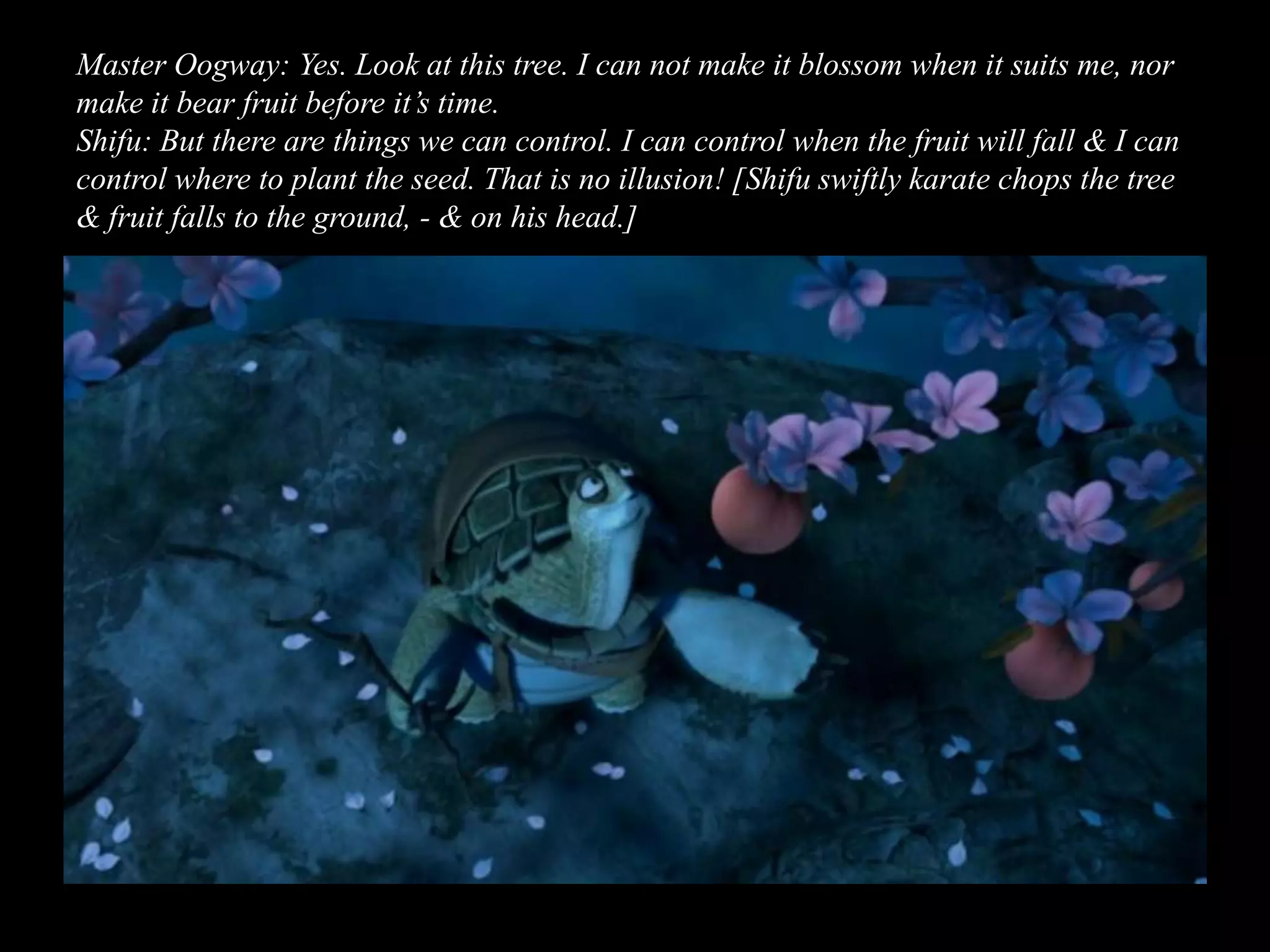
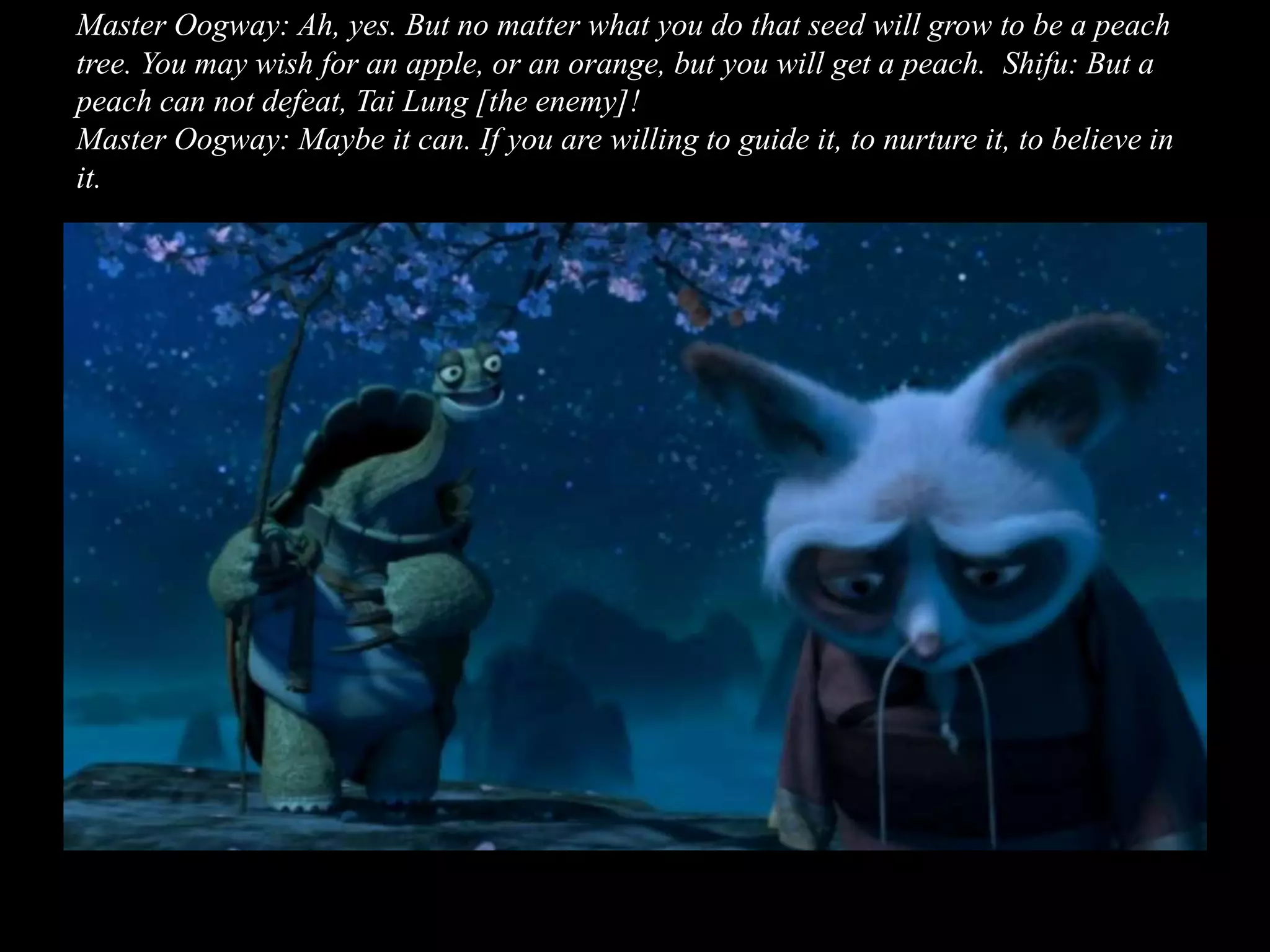
Embracing uncertainty
This is the very heart of the matter. Embracing uncertainty means you stop wasting energy trying to force reality to be something it’s not. You stop trying to turn your “peach” of a life into an “apple”. (Po is a panda, not a lean warrior – so Shifu cannot train him in the traditional way or expect him to conform to conventional standards)
You can’t control the seed you were given. You can’t control the economy, what your boss ultimately decides, or how other people will behave.
What you can do is to shift from control to influence. You accept the “peach” that is right in front of you – your current job, your unique (even weird) set of skills, your actual life – and start asking, “How can I guide this? How can I move on from where I am now?”
Trust only movement. Life happens at the level of events, not of words. Trust movement.
Alfred Adler
Embracing uncertainty
Read more: Self-leadership – The Art of Leading from Within
From “right” to authentic
The quest for certainty blocks the search for meaning. Uncertainty is the very condition to impel man to unfold his powers.
Erich Fromm
We all get stuck from time to time, right? What’s the “right” career? What if I choose the “wrong” city? What if this isn’t the “right” partner?
We’re so terrified of making a mistake that many times, we end up doing nothing at all. And yet, does that “right-ness” really matter at all?
Why are we so obsessed with it, anyway?
I think it’s because we’re taught from a young age that being “right” (getting the A+, following the rules, meeting expectations) is how we earn love and avoid being disliked or “excommunicated.” Our parents, teachers, and bosses often (with good intentions) teach us to be liked rather than to be authentic. To value recognition over efforts. To seek validation rather than just being ourselves. To be “right” in the eyes of others – rather than in the eyes of ourselves.
Even for those who seem ‘rebellious’ (e.g. the teenagers who frequently post provocative things online), they are, deep down, just chasing attention in a different way. Their actions are, after all, driven by the fear of being unseen or irrelevant – a subtle form of self-obsession.
Whether we decide to conform for validation or rebel for attention, the root is the same: we’re measuring our worth by external metrics instead of our own internal compass.
We become terrified of any choice that might lead to disapproval or irrelevance – terrified, in short, of making a “wrong” turn.
And yet, a life built on avoiding mistakes is one half-lived. Meaning isn’t hidden in one “correct” choice; it’s in what we bring to the choice.
It’s about picking a path and walking it with your whole heart, even if it looks weird to everyone else.
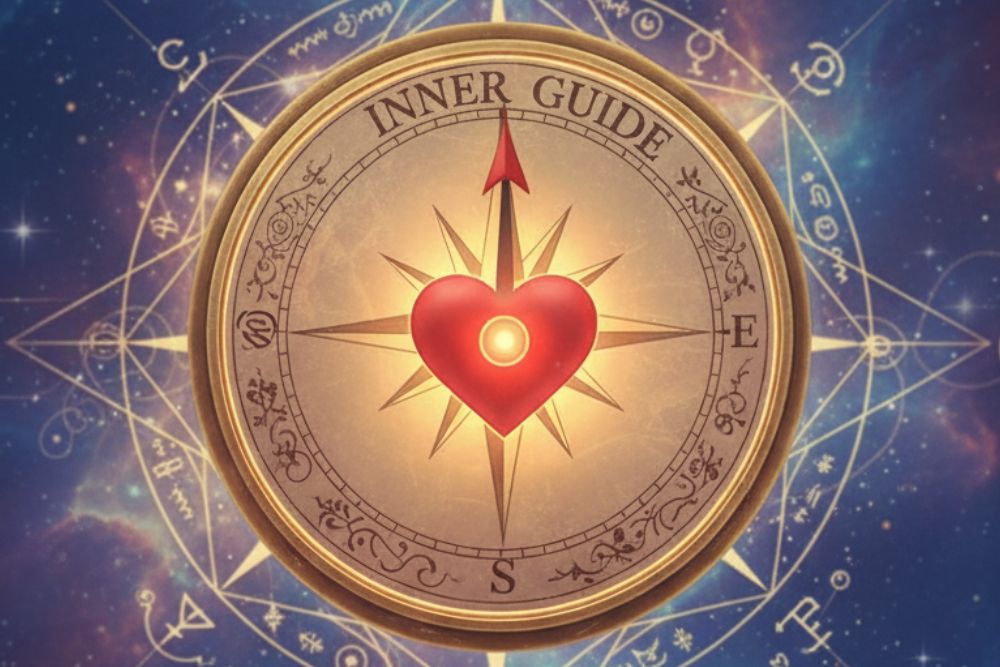
Embracing uncertainty
To quit one’s “safe” corporate job and become a struggling artist isn’t wrong.
To prioritize a quiet, simple life over a high-status career isn’t wrong.
As long as a decision feels authentic to you – as long as you make it with intention – then it is the right one.
There is no absolute formula for happiness; each unique condition of life can serve as the foundation for happiness in its own unique way. You can be happy when married with children, or when married without children. You can be happy when you are single, without a college degree, or with one. You can be happy when you are slim, you can be happy when you are overweight. You can be happy when living in a warm climate as in California, you can be happy when living in Montana, where you have severe winter conditions. As a sumo wrestler, you can be happy when you make it to yokozuna, or you can be happy while remaining one of the underdogs all your career, doing small chores, never giving up.
Ken Mogi
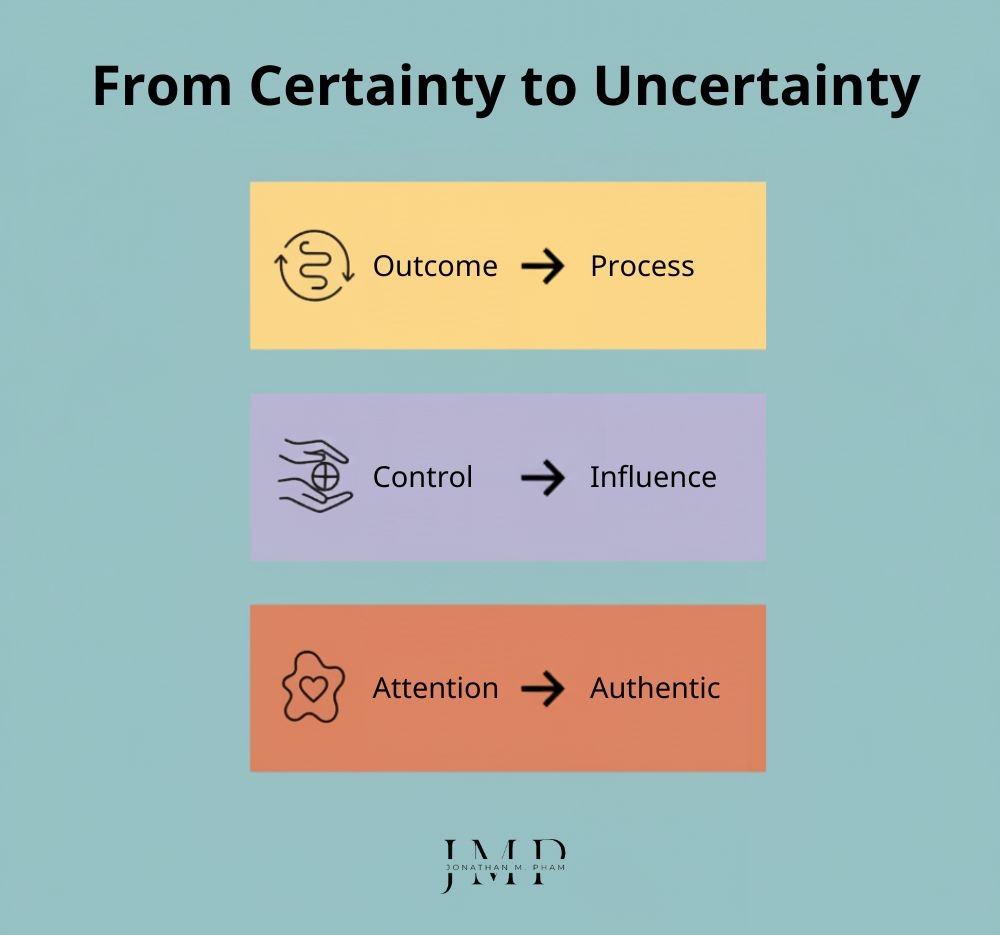
Embracing uncertainty
Read more: Ikigai (生き甲斐) – The Blueprint for an Abundant Existence
Challenges of Embracing Uncertainty
Carrying out change is ‘death itself’. Regardless of how dissatisfied you may be with your current situation, can you choose death? Can you throw yourself into the bottomless darkness?
Ichiro Kishimi, ‘The Courage to Be Happy’
If it were as simple as just deciding to be more like Oogway, we’d all be enlightened masters by now, sipping tea under a peach tree.
But it’s not. The moment we genuinely try to let go, to live in this new way, we run head-on into a wall of resistance – not only from within, but from without too.
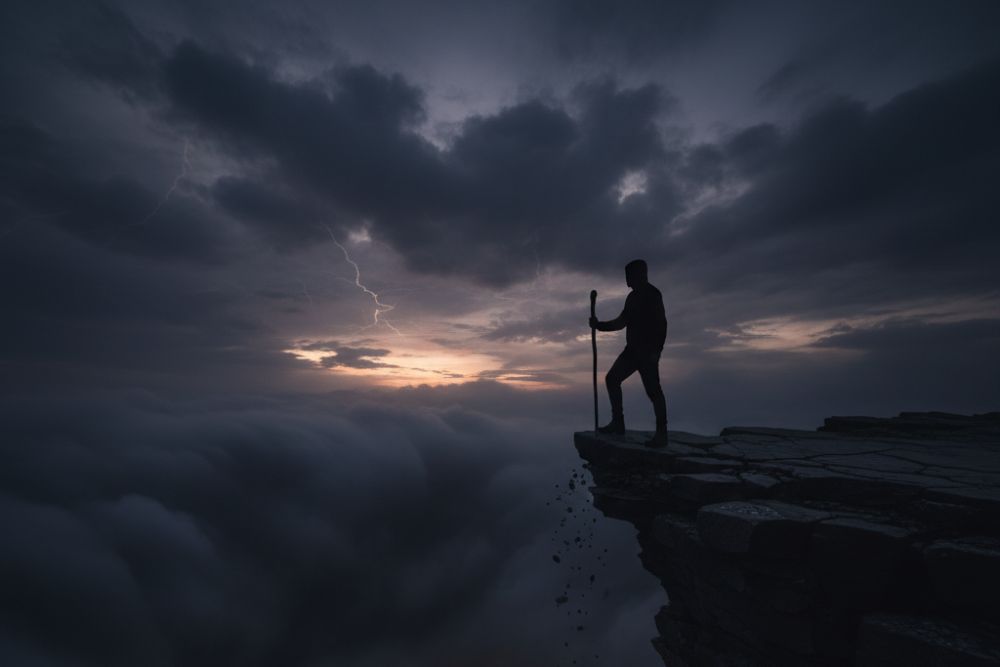
Embracing uncertainty
The prevalence of false promises
The whole problem with the world is that fools and fanatics are always so certain of themselves, and wiser people so full of doubts.
Bertrand Russell
Because we’re so desperate for a map, we are incredibly vulnerable to anyone who claims to have one. And the unfortunate truth is that the world is full of people willing to sell us simple, confident lies to calm our anxiety – and to get our money, our vote, or our compliance.
We see it everywhere.
We see it in politicians making vague, grand promises they can’t possibly keep.
We see it in bosses demanding impossible KPIs, as if hitting a number on a spreadsheet can magically erase real-world complexities.
I myself saw it every single day in my previous SEO job. Clients, out of ignorance or stubbornness (or a combination of both), would demand a “guarantee” of a #1 Google ranking (or something similar) – a promise that, in the ever-changing world of search algorithms, is a complete illusion.
What’s more? Agencies know that, so they intentionally “trick” the client into agreeing with a set of keywords/ maintenance tasks that do not guarantee any real impact on the business at all. (this may sound nihilistic, but I have to admit it based on my own personal experience)
Some business owners/ managers intentionally take advantage of them being the “buyer” – the one in power – to push agencies/ specialists to work harder than possible, or to commit to an aggressive timeline/ unrealistic sales goal. By framing the demand as “simple commitment” or “accountability,” they make it seem like the only reason the target might not be met is a lack of effort or willpower. Even when they are fully aware, either consciously or unconsciously, of the impact of numerous factors beyond one’s control (market conditions, competitor actions, supply chain issues, etc.). No wonder many end up succumbing to inflated expectations, burnout, depression – and worse, death from overwork.
Many people out there sell links, claiming that they own high-quality sites with tons of traffic that will boost a website’s performance in no time. But the thing is, many of these “high-quality sites” are actually scams, utilizing shady techniques to look as if they are very authoritative. (I’m not going too deep here; hope that you can – kind of – get the idea, especially those who already have first-hand experience like me)
We know these are oversimplifications, but we buy in anyway. Why?
Because the lie, for a moment, feels better than the truth.
Because most of us care about looking successful/ powerful more than being real.

And the great danger is that if you live on a diet of these comfortable lies for too long, you eventually lose the ability to distinguish truth from fiction at all. Just like those in the tale of “The Emperor’s New Clothes” – too ignorant, too self-centered, too fearful to face reality and speak up.
Many managers force a commitment they know is unrealistic, setting their team up for failure just to cover themselves.
In relationships, the demand for absolute emotional certainty (“Promise you’ll never leave!”) becomes a tool of control – one that allows abusive/ insecure people to exploit the partner’s fear of abandonment.
And it’s not just others selling us lies; we sell them to ourselves constantly. For example, I remember once excusing myself for not having a girlfriend by telling myself (and others) that I needed ‘financial stability first.’
On the surface, it sounded responsible, socially acceptable. However, the real truth was that I just hadn’t found someone who resonated yet. And I was completely unaware of it – until a friend pointed out a flaw in my ‘rational’ excuse (e.g. ‘Are you sure it’s about money, or are you just waiting for the ‘perfect’ person?’).
Only then did I realize the unconscious self-deception I’d wrapped myself in.
How about you? How often do these little ‘rationalizations’ become the unquestioned ‘truth’ of your life?
We take refuge in pride, because we are afraid to tell the truth to ourselves.
Okakura Kakuzo

The dark side of identity
There is no such thing in the world as absolute evil or absolute good. There is good to be found within evil, and plenty of evil to be found within the good.
Shusaku Endo
This is a form of social pressure, and it’s one we, many times, inflict on ourselves.
To feel safe and “right” in an uncertain world, we grab onto solid labels: “Christian,” “atheist,” “conservative,” “liberal,” “intellectual,” “artist.” These identities give us a tribe, a script, and a set of pre-approved “certain” answers.
Many times, the pressure to conform comes not just from abstract belief, but from the fear of gossip, ridicule, or being ostracized by the community if we step out of line.
The problem is, our identity can quickly become a fortress. We stop protecting the truth and start protecting the “label”.
I saw a perfect example of this on a Catholic Reddit thread I recently came across. Someone asked about the theologian Richard Rohr. The responses were, overwhelmingly, dismissals. Not by critically analyzing or engaging with his ideas, but by labeling him:
- “He’s a New Age thinker”
- “He uses Eastern mysticism”
- “Don’t read him.”
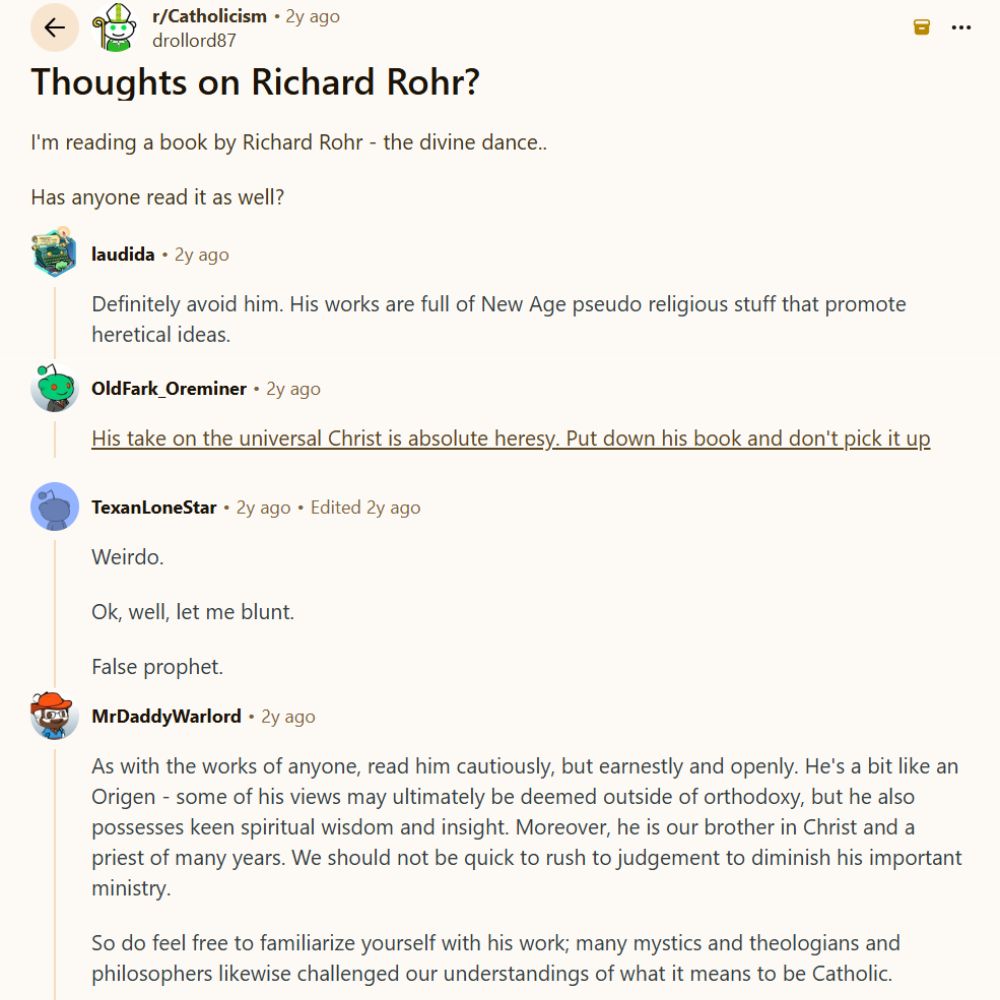
If there’s one thing I can see from these answers, it’s this: the people on the thread attacked Rohr not because his ideas were wrong – but because they posed a threat to their identity.
This is just the “four legs good, two legs bad” mentality we discussed above. It’s a thought-stopping slogan, not a thought. And it’s everywhere – in politics (my party is right, yours is evil), in academics, and even in our personal lives.
That ‘Don’t read him’ response feels so familiar. To me, it seems very much like how my conservative, or perhaps I should say “ignorant,” Catholic neighbors tend to dismiss ‘outsiders’ – anyone who doesn’t fit their mold (if you are interested, feel free to read more about it here)
It’s an example of how identity, when we cling too rigidly to it, causes us to succumb to division and hatred. Not really out of ideological disagreement, but out of FEAR – the fear of what is not familiar, of the ‘Eastern’ idea that truth might be ‘both/and’ rather than a simple ‘either/or.’
This ‘us vs. them’ thinking is, perhaps, the single greatest barrier to learning from one another, and it’s fueled entirely by a fear of the uncertainty that lies outside our own tribe’s walls.
When you call yourself an Indian or a Muslim or a Christian or a European, or anything else, you are being violent. Do you see why it is violent? Because you are separating yourself from the rest of mankind. When you separate yourself by belief, by nationality, by tradition, it breeds violence.
Jiddu Krishnamurti
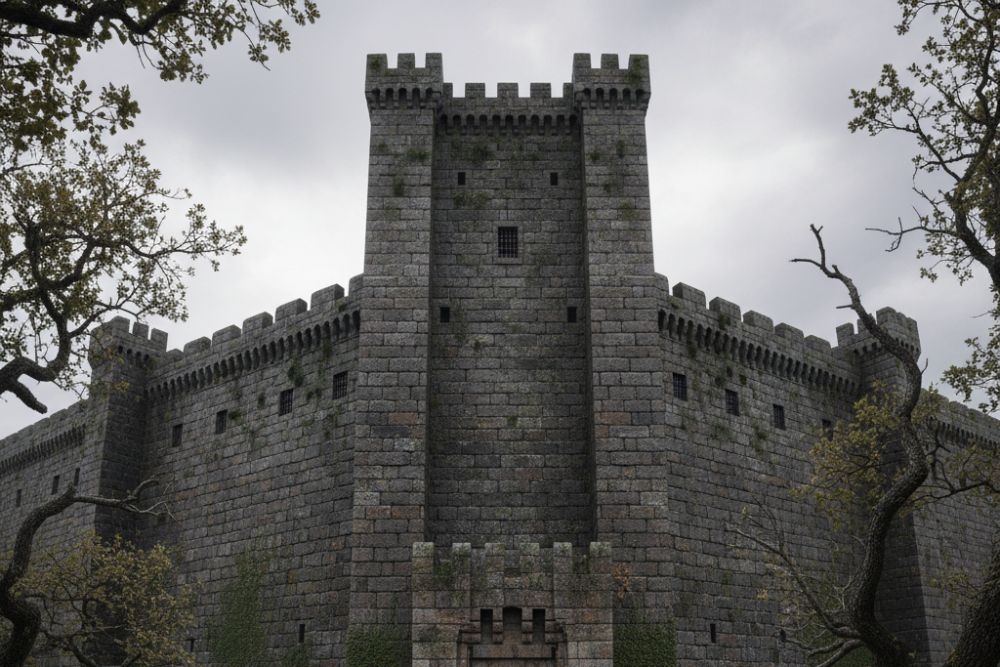
(As a side note, I’m an East Asian myself – an East Asian Christian who loves Buddhism and finds deep wisdom in Taoism and Zen. So, when I see my fellow Catholics dismiss Rohr’s ideas as ‘too Eastern,’ I can’t help but feel… well, ‘proud,’ in an unusual way.
Perhaps part of the reason why I find it easier to question rigid doctrines, and not cling to any identity, has to do with the fact that I used to feel like a bit of an ‘outsider’ myself – as a kid who grew up in a very conservative Catholic community back in the day, and who was bullied a lot by other kids.
When you don’t fit neatly into the box, you’re more inclined to look outside it)
Read more: The Excessive Need to Be Me – When the Ego Takes Over
The paralysis of overthinking
Our doubts are traitors, and make us lose the good we oft might win, by fearing to attempt.
William Shakespeare
Overthinking is when our rational mind, the very tool we’ve been taught to trust, goes into overdrive. It hates an open question. It runs endless, exhausting “what-if” scenarios, trying to calculate and control an outcome that is, by its nature, uncontrollable.
I’m sure you’ve been there. A friend suddenly goes quiet, stops replying to texts. Your “rational” mind doesn’t just sit with the uncertainty. It creates a dozen painful, elaborate theories:
“What did I say?”
“Are they angry?”
“Did something terrible happen?”
In other words, you get trapped in an “endless cycle of assumptions” about things that are not within your ability to know at all. What good will it do?
Or, how about this? Have you ever spent many weeks researching the ‘perfect’ laptop or camera, reading hundreds of reviews – until you’re so overwhelmed by ‘what-ifs’ that you just give up?
Or, have you written the same email a dozen times, trying to account for every possible way the recipient might misinterpret it?

Far too often, we get so stuck in this ‘analysis paralysis,’ terrified of making a mistake, that we do nothing at all.
This paralysis is the mind’s last-ditch attempt to avoid uncertainty. It’s the illusion that if we just think hard enough, we can find a single ‘perfect,’ risk-free path.
But as we know, no such path exists at all.
These challenges are all forms of the same thing: a desperate clinging to conviction. We think a strong belief is a virtue, but when it’s just a shield against fear, it becomes a prison.
The conviction that ‘I must never fail’ is what keeps you from ever trying.
The conviction that ‘I must find the perfect partner’ blinds you to the good, imperfect people right in front of you.
The conviction that ‘my way is the only right way’ isolates you from the very people you crave connection with.
Convictions are more dangerous foes of truth than lies.
Friedrich Nietzsche

The trap of emotions
We are more often frightened than hurt; and we suffer more in imagination than in reality.
Seneca
It’s the moment our own minds, in a desperate attempt to protect us, become our own prisons. We refuse to confront uncertainty – not out of logic, but out of the sheer force of our own overwhelming emotions (grief, anger, desire, etc. to name a few).
In his book No Death No Fear, the late Zen Master Thich Nhat Hanh tells a parable that, I think, is a perfect example of this:
A young tradesman came home and saw that his house had been robbed and burned by bandits. Right outside what was left of the house, there was a small, charred body. He thought the body belonged to his little boy. He did not know that his child was still alive. He did not know that after having burned the house, the bandits had taken the little boy away with them. In his state of confusion, the tradesman believed the body he saw was his son.
So he cried, he beat his chest and pulled out his hair in grief. Then he began the cremation ceremony.
This man loved his little boy so much. His son was the raison d’e tre of his life. He longed for his little boy so much that he could not abandon the little boy’s ashes even for one moment. He made a velvet bag and put the ashes inside. He carried the bag with him day and night, and whether he was working or resting, he was never separated from the bag of ashes.
One night his son escaped from the robbers. He came to the new house built by his father. He knocked excitedly on the door at two o’clock in the morning. His father called out as he wept, still holding the bag of ashes.
“Who is there?”
“It’s me, your son!” the boy answered through the door.
“You naughty person, you are not my boy. My child died three months ago. I have his ashes with me right here.”
The little boy continued to beat on the door and cried and cried. He begged over and over again to come in, but his father continued to refuse him entry. The man held firm to the notion that his little boy was already dead – and that this other child was some heartless person who had come to torment him.
Finally, the boy left – and the father lost his son forever.
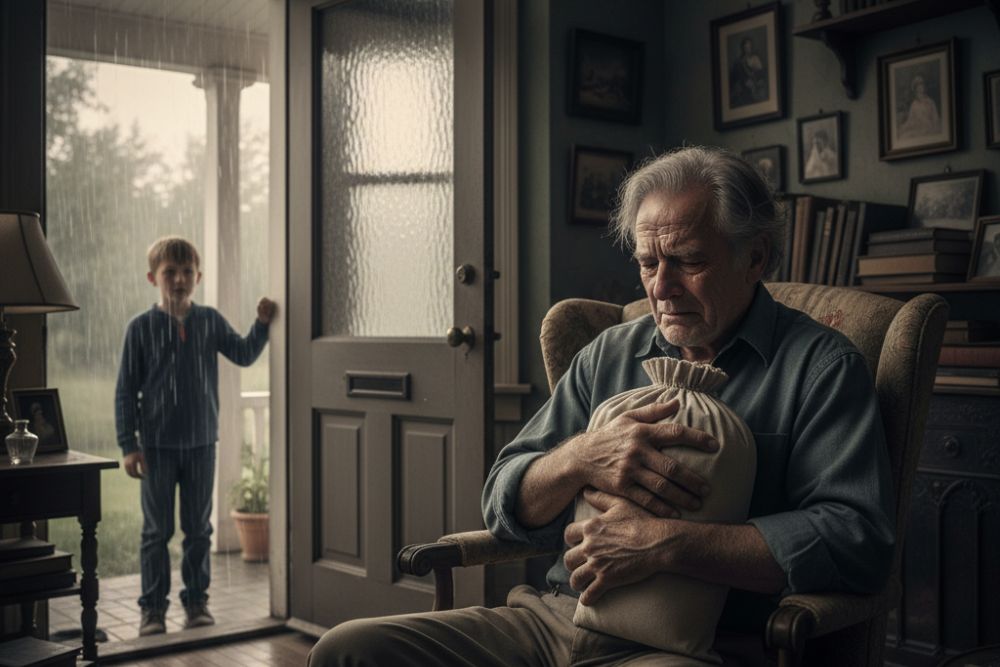
Even now, I still find the story haunting. The father’s grief, a profound and real emotion, solidified into an idea that seemed so real that nothing else could enter his mind. He clung to his miserable “fact” (the ashes) rather than just being brave enough to open the door – and let reality come in.
He got caught in one idea, and as Thich Nhat Hanh said, “Even if the truth comes in person and knocks at your door, you will refuse to open your mind.”
We see this many times in life, right? When someone cuts us off in traffic, our rage instantly creates a “certain” story that they are a selfish, horrible person. It blinds us to the uncertain (but possible) reality that they are in an emergency, rushing a loved one to the hospital.
Another example. For some of us, that desperate need for a relationship drives us to believe that a toxic partner is “the one”. We end up ignoring all the real, knocking-on-the-door evidence – from our friends, our family, our own gut – that the relationship is not healthy at all.
In each case, our own feeling creates a “fact” that makes us blind to the truth right in front of us.
The desire for security and the feeling of insecurity are the same thing. To hold your breath is to lose your breath.
Alan Watts
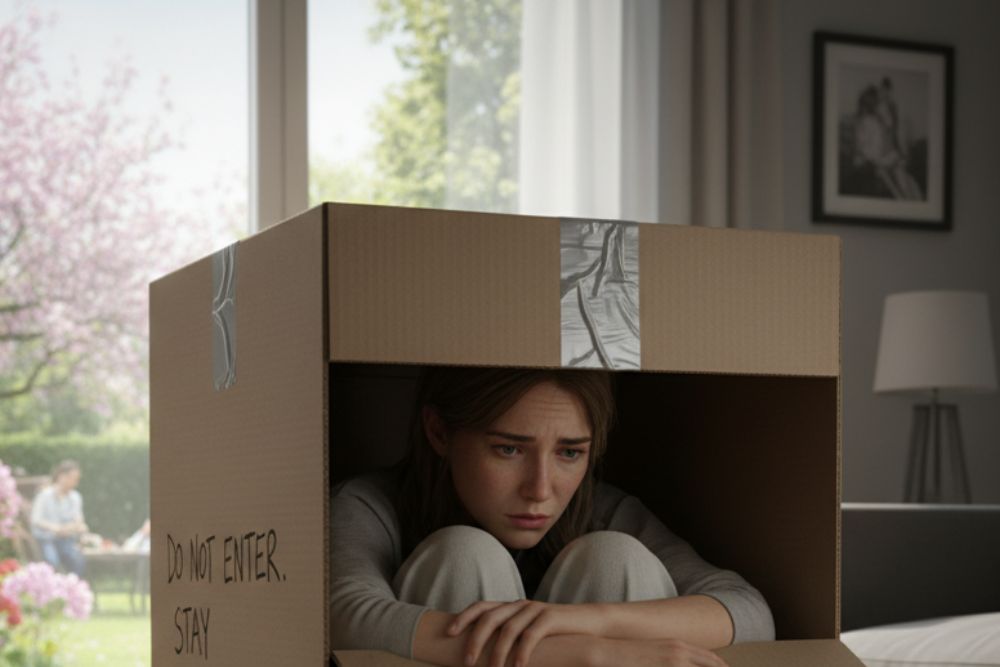
Read more: Understanding Emotions – Key to Balance & Success in Life
The seduction of “fake certainty”
We follow authority – if not that of a person, then of a system, of an ideology – because we want a result that will be satisfactory, which will give us security. We really do NOT want to understand ourselves, our impulses and reactions, the whole process of our thinking, the conscious as well as the unconscious; we would rather pursue a system that assures us of a result.
Jiddu Krishnamurti
I remember once reading a story about an atheist scholar and an old woman that goes like this (which, as I later found out, speaks to a philosophical argument called “Pascal’s wager“):
In a crowded public square, a renowned Scholar – a man celebrated for his philosophical arguments against religion – had just finished a dazzling lecture on the non-existence of God. His audience was enthralled, their applause resounding as he gathered his notes.
Just as he was about to depart, an old woman, humble and dressed in simple clothes, made her way to the front and addressed him in a gentle voice.
“Sir Scholar, your words were truly magnificent,” she said. “I am a plain woman with no learning, and I cannot match wits with you. I have only one question for you.”
The Scholar paused and gave her his assent.
“Consider first: If you choose to believe in God and live your life accordingly, and then you discover in death that God does not exist. What, truly, have you lost?”
The Scholar considered this. “I would have lost some earthly freedom, perhaps some pleasures, and some time spent in prayer.”
“A finite loss, then,” the woman confirmed. “A few brief, worldly things.”
“Now, consider this: If you choose to believe in God and live your life accordingly, and then you discover in death that God does exist. What have you gained?”
“I would have gained entry into the presence of an Almighty Creator,” the Scholar conceded.
“An infinite gain,” the woman concluded. “An eternity of happiness.”
“But finally, Sir Scholar, consider this: If you choose not to believe, and yet when you draw your last breath, you discover that God does exist. What have you lost then?”
The Scholar stood silent, his brilliant mind momentarily frozen.
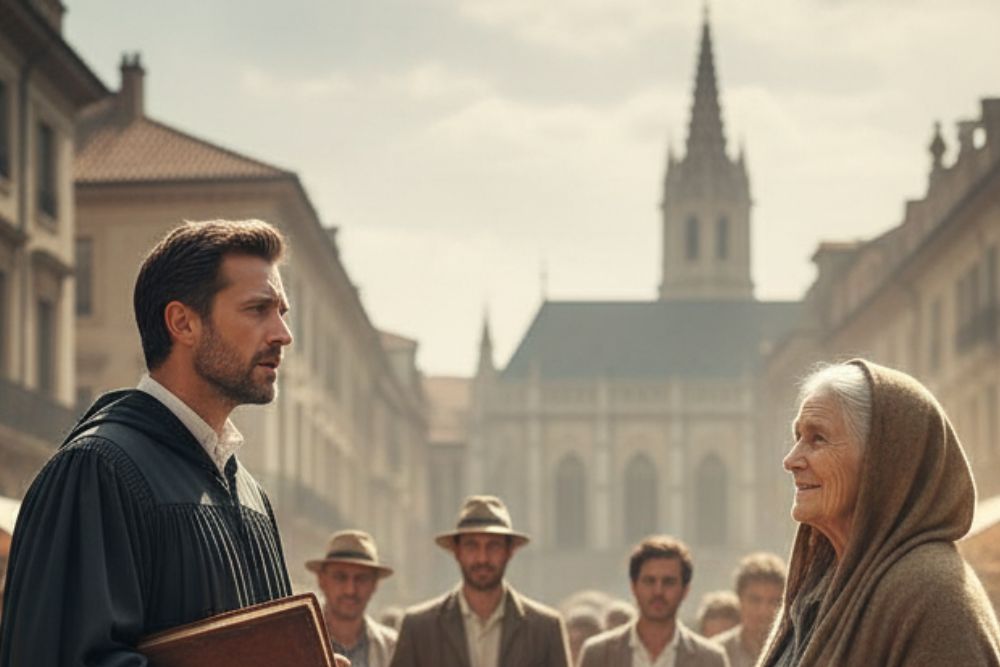
Embracing uncertainty
As a kid, I found this “solution” to be totally convincing. But now… I have to admit, it feels “childish.”
Why? Because it’s an argument that encourages a “faith” born NOT out of love, authenticity, or a genuine search for truth, but out of a self-interested fear of punishment and a greed for reward.
It’s something utilitarian, not spiritual at all.
A faith, a love, or a commitment born of fear and reward will crumble at the first sign of real suffering. Think about how many people decide to leave their company as soon as their benefits are threatened, or as soon as another company offers higher pay. If the organization does not foster any real sense of meaning in the job at all (whether through an inspiring, resonating vision/ investment in training & skill development/ supportive relationships/ psychological safety, etc.) aside from the paycheck, that is going to happen – for sure!
It is the very definition of a “house built on sand.”
Nowadays, we see this pattern of seeking easy certainty everywhere, often dressed up as ‘rational’ solutions or quick fixes. For example:
- The various get-rich-quick schemes or “guaranteed” investment returns that prey on our financial anxieties.
- The fad diets that promise effortless, permanent transformation.
- The strong, loud voices that claim to have easy answers to complex political or societal problems.
In each case, a complex reality is replaced by a simple, seductive promise.

I remember back in the day, I came across Mark Manson’s website, on which he introduced himself as “life advice that does not suck“. To be honest, I was a little appalled by that slogan at that time.
But now thinking about it, I suppose there’s a reason why Mark chose to go with that motto. It’s because there’s some truth behind it. That a lot of life advice DOES suck. Especially the one that many self-help experts tend to share.
It’s not necessarily that it’s wrong; I do believe that series like Chicken Soup for the Soul have offered comfort and value to many. But what I find is that many times, the advice falls flat – because it promises certainty where there is none.
It offers simple formulas, quick fixes, or fairy-tale endings that ignore the messy reality of life.
It tends to point us toward a guru or an external “answer,” rather than empowering us to become the authors of our own journey.
It’s like a painkiller that masks the symptom without addressing the root cause, ultimately keeping us stuck in the very patterns we want to escape.
In our efforts to embrace uncertainty, we are – in reality – just clinging even more rigidly to certainty. And I believe such a line of thinking will get us nowhere at all.
A mind that is truly uncertain has no fear. It is only the mind that is afraid, that follows, that demands authority.
Jiddu Krishnamurti
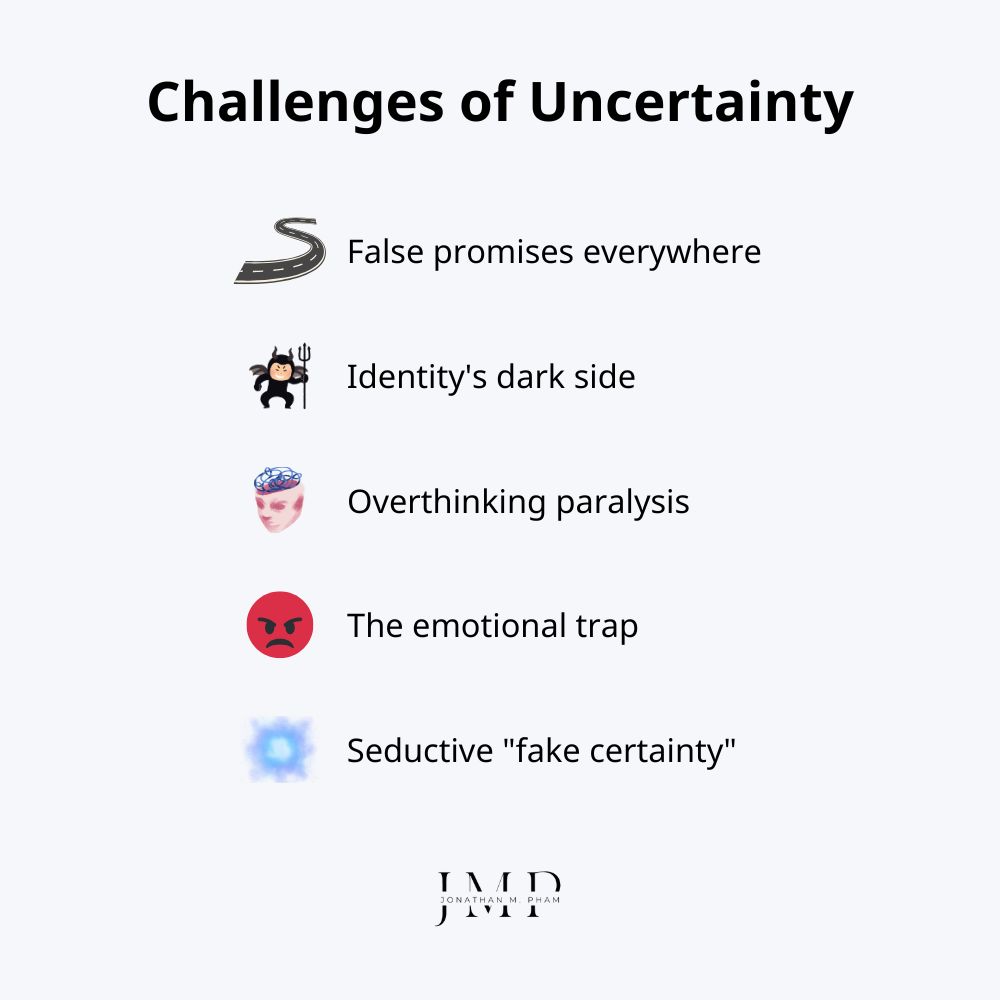
Challenges of embracing uncertainty
How to Embrace Uncertainty
Do everything in your human power, and then wait for the decree of heaven.
We’ve talked about the why. We’ve seen the challenges. Now, we get to the most important part: the how.
How do we confront the unknown without simply becoming reckless?
It’s tempting, especially in our culture, to equate “embracing uncertainty” with a kind of YOLO (“You Only Live Once”) impulsivity – jumping off cliffs, consequences be damned.
But that’s not what we’re talking about here.
The philosopher Søren Kierkegaard, famous for his concept of the “leap of faith,” once stressed that this leap comes only after reflection. Rather than a blind jump into the void, it’s a conscious choice made after grappling honestly with the uncertainty.
It’s stepping forward because you’ve reflected, NOT because you haven’t.
Instead of throwing caution to the wind, it’s about cultivating the inner strength and courage needed to act wisely when the path ahead is foggy. And it is something that can be achieved through daily efforts.
Below are a few key practices that, as I figure, have helped me the most.
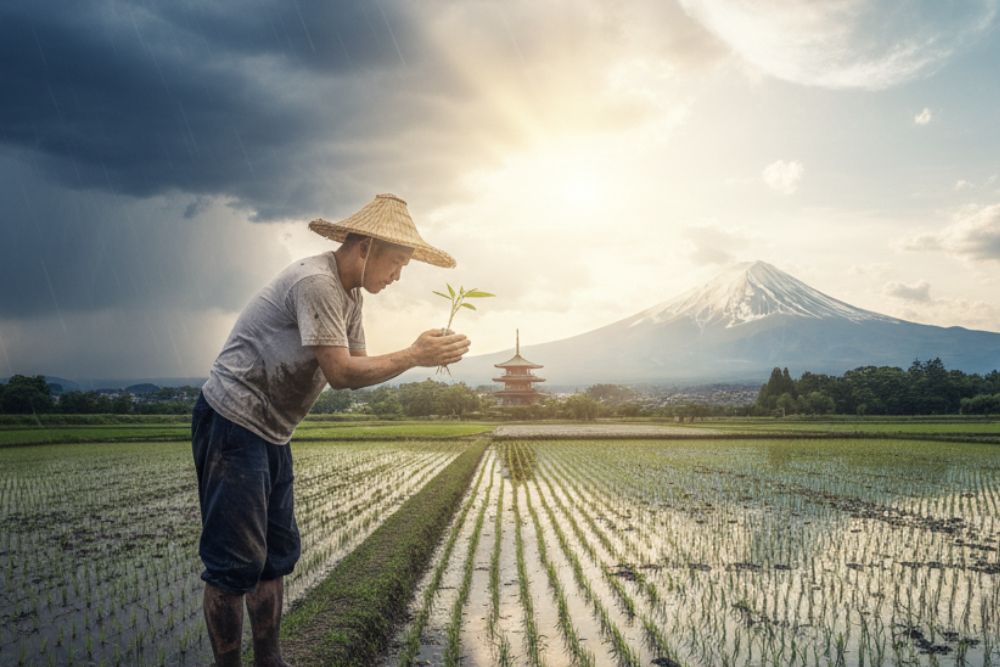
Anchor in your values
When in doubt tell the truth. It will confound your enemies and astound your friends.
Mark Twain
When everything seems so uncertain – when the path ahead looks so daunting, you need an internal compass: your set of core values.
These are what provide the foundational “why.” They are the answer to the question, “What truly matters to me, regardless of the outcome?“
Your “Way” might be different from mine. Perhaps you’re drawn to the Stoic principles of virtue and self-control. Maybe it’s the Buddhist path of compassion. The key is to know what your anchor is.
For me, I’ve found my anchor in two core ideas (among others too): a kind of anti-materialism and a deep commitment to social harmony (what the Japanese call wa or nagomi – 和).
My anti-materialism isn’t about rejecting money; it’s about rejecting the idea that my worth is tied to it. It’s a belief that true wealth is intrinsic – honor, dignity, learning, and service.
Thanks to it, I have been able to, somehow, brace the uncertainty of following my passion (and sacrificing my full-time profession) until now. And also thanks to it, I have found myself not easily moved by the exaggerated claims of many so-called “influencers”/ “celebrities”/ “experts” on social media.
At the same time, my commitment to harmony allows me to focus less on personal gain – but on service to the community.

Speaking of which, I remember I had a mental crisis during the first few months after starting this blog. At that time, I was obsessed with “vanity metrics” like website traffic and revenue. The uncertainty of those numbers was making me miserable.
I had to, eventually, re-anchor by asking myself, “Why am I really doing this?”
The answer was clear: to serve, to share, to connect.
As soon as I realized (and accepted) that, my goal shifted from “How many clicks can I get?” (an unknown outcome) to “Did I create something honest and helpful today?” (a controllable process).
This mindset shift – from an obsession with results to a conviction in one’s values – is what allows us to stand firm in the wind.
Somehow, it reminds me of the time I watched the movie Bridge of Spies, where the lawyer James Donovan (played by Tom Hanks) is tasked with defending a Soviet spy, Rudolf Abel, at the height of the Cold War. He faces immense public hatred (as people are under the impression that he works for the “enemy”), and the outcome of what he does is dangerously uncertain.
But Donovan does not base his decisions on public opinion. Nor does he think too much about winning the case. He is driven solely by his values: the Constitution, due process, and his own integrity. It doesn’t matter what others think; he knows he is acting honorably – and that alone is enough.
Abel later describes Donovan as a “Stoikiy Muzhik” – a “Standing Man,” referencing a man from his childhood who, no matter how many times he was beaten down, simply got back up. Like that man, Donovan could “stand” because his feet were planted firmly on the rock of his principles.
I was at the age of your son, our house was overrun by partisan border guards. My father was beaten, my mother was beaten, and this man, my father’s friend, he was beaten. And I watched this man. Every time they hit him, he stood back up again. So they hit him harder. Still he got back to his feet. I think because of this they stopped the beating.
That moral clarity, as demonstrated in one of the film’s taglines, is just “the difference between war and peace.” It’s the proof that among the midst of uncertainty, the only hope one has is to be an “honest man/ woman“. To be anchored in one’s values.
When you know what your “treasures” are, you become a “Standing Man” or “Standing Woman” in your own life. Decision-making in the fog becomes infinitely simpler. You just ask: “Which path, no matter how scary, aligns with my deepest ‘why’?”
Will my first step change the world? Maybe it will change, and maybe it will not. But one does not need to think now about what the results will be, or anything like that.
Ichiro Kishimi, ‘The Courage to Be Happy’
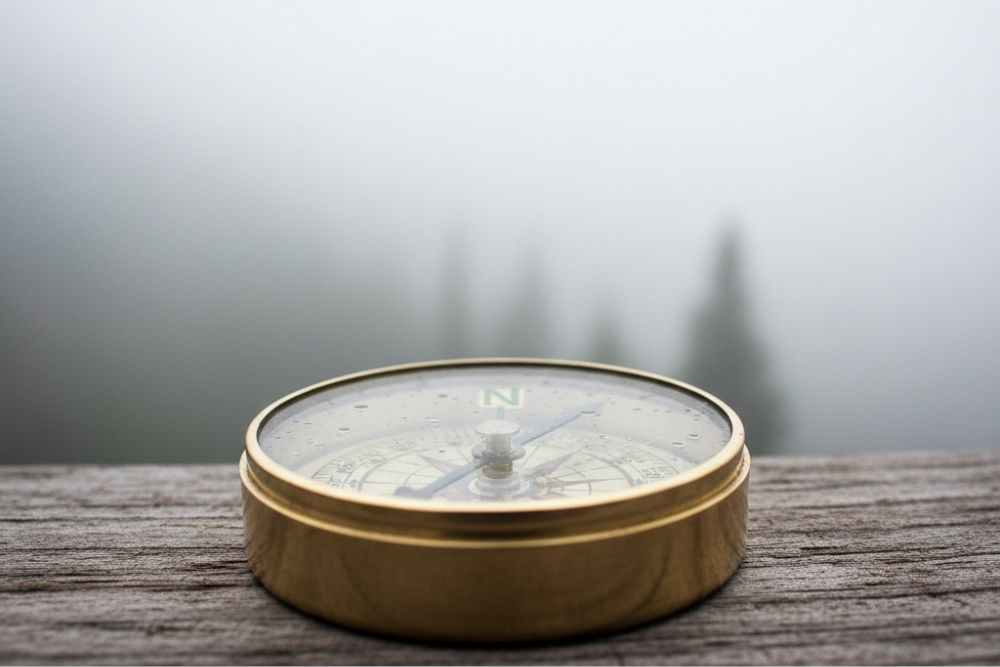
Embracing uncertainty
Develop mindfulness
The greatest obstacle to living is expectancy, which hangs upon tomorrow and loses today. You are arranging what is in Fortune’s control and abandoning what lies in yours.
Seneca
Our anxiety doesn’t live in the present moment. It lies in the future. It’s a “what-if” machine.
“What if I fail?”
“What if they leave me?”
“What if I get sick?”
Uncertainty is a problem of the future. The one place where it cannot exist is this exact moment.
Right now, you are reading this sentence. That is all. In this second, you are okay.
The practice of mindfulness, or meditation, is simply the training of returning your mind to the “now.” It’s not quite about “emptying your mind” or achieving some mystical state (well, at least for the ordinary person like you and me).
It’s just about noticing.
When you feel that familiar spiral of anxiety, just observe it. “Ah, I am overthinking again.” Then, bring your attention back to your senses.
What can you feel? The chair under you? The air on your skin?
What can you hear? The hum of a fan? The sound of your own breathing?
You are bringing yourself back to the only thing you can ever truly control: your response to this moment.
The idea behind mindfulness (and other spiritual practices) is not to escape discomfort, or to succumb to what many people refer to as “spiritual bypassing“. Quite the opposite actually. What it does is train us to stay present with reality, rather than running away into worry or denial.
Over time, it will give rise to what the poet John Keats referred to as ‘Negative Capability‘ – the quiet strength to simply be with mysteries and doubts, without that frantic need to immediately solve or explain them away.
I suppose by now, some might wonder: how is it possible that one can just sit with reality – and not panic at all?
I believe we can revisit the story of the movie Bridge of Spies to better understand this point. After being captured by FBI agents, the Soviet spy Rudolf Abel faces his trial and a potential death sentence. When his lawyer, Donovan, asks him if he isn’t worried about being executed, Abel simply replies:
“Would it help?”
And he repeats this mantra throughout the whole storyline.
To me, Abel’s question is a profound mindfulness tool. It’s not about being cold or superhuman; it’s a perfectly rational assessment.
It forces you to see anxiety for what it is: an unproductive expenditure of energy on an uncertain future you cannot control.
Asking “Would it help?” is a way of calling your own bluff, allowing you to let go of the unproductive spiral, and return to the present moment.
If a problem is fixable, if a situation is such that you can do something about it, then there is no need to worry. If it’s not fixable, then there is no help in worrying. There is no benefit in worrying whatsoever.
Dalai Lama
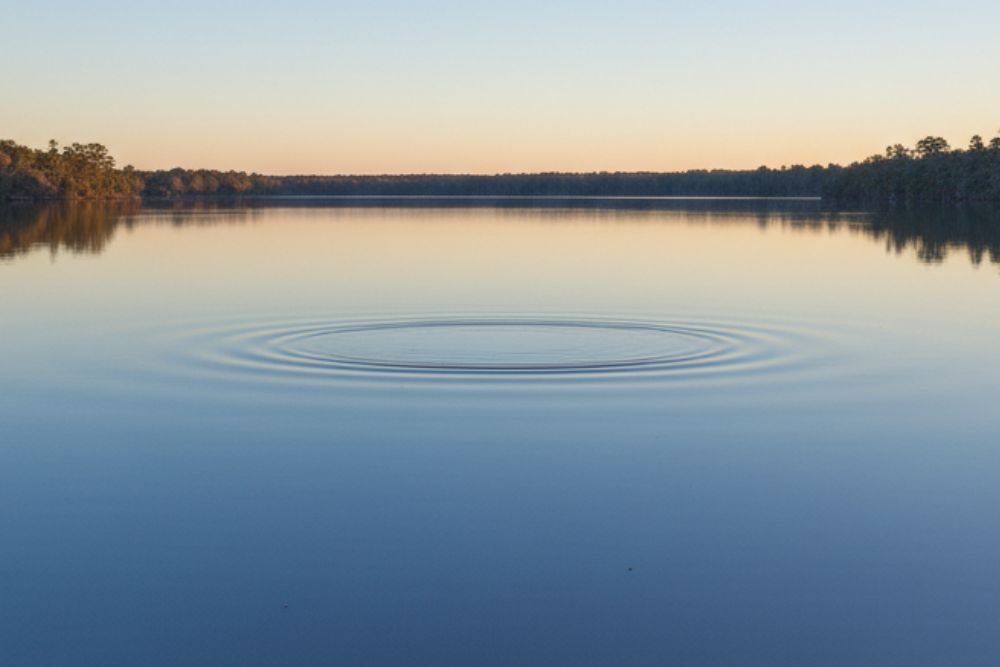
Read more: Find the Beauty in Everyday – 8 Tips for Uncovering Joy & Wonder in the Little Things
Cultivate curiosity
Let go of certainty. The opposite isn’t uncertainty. It’s openness, curiosity and a willingness to embrace paradox, rather than choose up sides. The ultimate challenge is to accept ourselves exactly as we are, but never stop trying to learn and grow.
Tony Schwartz
What if uncertainty wasn’t a threat to be managed, but an invitation to be curious?
Have you ever thought about it that way before?
It’s not easy to adopt such a line of thinking, but I dare to say that it’s a liberating one that will facilitate a powerful mindset shift.
Back in the day, I came across a wonderful TED Talk that addressed the theme of embracing uncertainty using two very inspiring metaphors. The first is to be a “mudlark” – i.e. someone who combs the shores of a river, looking for historical fragments. They don’t expect to find a perfect, whole Roman vase. They are thrilled to find a single, interesting “shard” – a piece of a cup, a broken tile.
This is how we should approach life. Stop looking for the “perfect, whole answer.” Instead, just be a mudlark. Collect shards of experience – an interesting article, a new recipe, a conversation with a stranger, a weird idea. See the incomplete as fascinating, not as a failure.
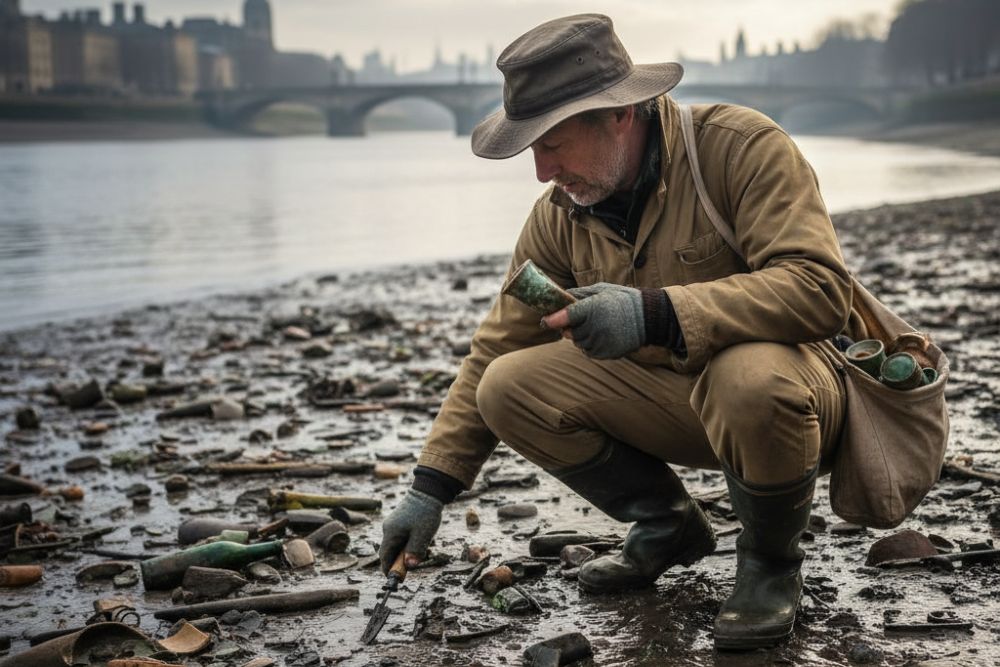
The second metaphor is Kintsugi (金継ぎ) – the Japanese art of repairing broken pottery with lacquer mixed with gold. Instead of hiding the cracks, the idea is to highlight them, believing the piece is more beautiful because it was broken and mended.
Your “breaks” – failures, heartbreaks, mistakes – are not things to hide. They are your own story.
When you mend them with self-compassion and what you’ve learned, they become the strongest, most valuable parts of who you are.
Far too often, we treat our perceived flaws/ lack of certain “competencies” as something to be ashamed of. Maybe you’re told you’re “too sensitive” in a tough work environment. Or perhaps you’re “too quiet” in a culture that rewards the loudest voice.
Maybe, like me, you’re not driven by financial metrics, which is often seen as a lack of “ambition.” Many of us view these as fixed, certain failures.
But what happens if we get curious about them?
Curiosity invites uncertainty in the best possible way. It takes that hard, certain label (“I am a failure at X”) and shatters it into a thousand new questions.
It asks: “What if this isn’t a flaw, but a feature? What if my ‘sensitivity’ is actually a superpower for empathy and connection? What if being ‘quiet’ means I’m a world-class listener and observer? What if my ‘lack of ambition’ is actually a different, more sustainable anchor of wisdom?”
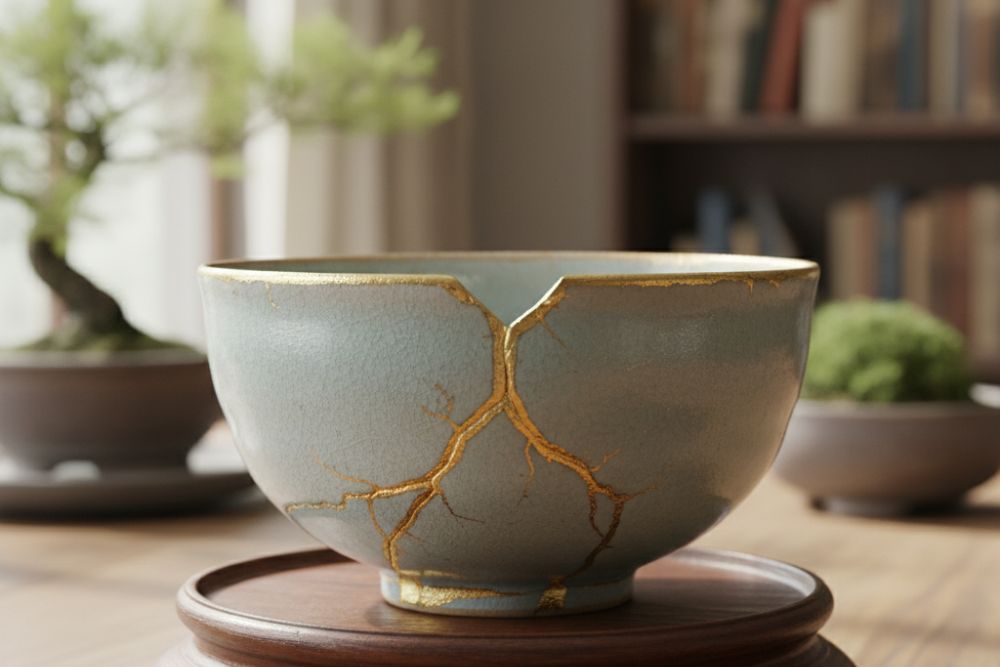
Curiosity is the engine that turns a “flaw” (a fake certainty) into a “shard” (a fascinating uncertainty to explore). It allows us to embrace the truth of who we are, rather than clinging to the “fact” that we’re not good enough.
It is by adopting a humble, open, and curious mind, free from the arrogance of “knowing-it-all,” that we may finally be ready to learn.
Sometimes, the train you took by mistake takes you to your destination.
Japanese Proverb
(If you are interested, please check out the whole TED Talk video down here)
Embracing uncertainty
Read more: Coachability – The Secret to Rapid Growth
Have a sense of humor
If I had no sense of humor, I would long ago have committed suicide.
Mahatma Gandhi
Life is often chaotic, unpredictable, and sometimes downright ridiculous. When our grand plans inevitably go sideways, when we make mistakes, or when things just don’t make sense, having the ability to step back and find the humor in the situation is incredibly helpful.
Humor’s power against uncertainty lies in its ability to instantly reframe our perspective. It allows us to step outside of our own heads and see our anxieties/ setbacks not as life-ending crises, but as part of the human condition.
Have you ever been meticulously prepared for something important – a job interview, a big presentation, or a difficult conversation – only for something to go wrong in the critical moment? For instance, your laptop died, you spilled coffee on your shirt, or you completely blanked on your opening line.
For the ordinary person, they are very likely to treat it as a disaster:
“I’ve ruined everything.”
“They think I’m an idiot.”
“My career is over.”
On the other hand, a humorous mind, after the initial jolt of panic, would find the absurdity.
“Okay, deep breath. That was… spectacularly clumsy. What can I do now?”
That small shift is everything. It’s not about dismissing real pain or denying that the situation is difficult. Rather, you refuse to let the weight of the situation crush your spirit entirely.
It’s a powerful way to reclaim your balance and bounce back from the unexpected.
The past is dead. The future is uncertain; the present is all you have. So eat, drink, and live merrily.
Albert Einstein
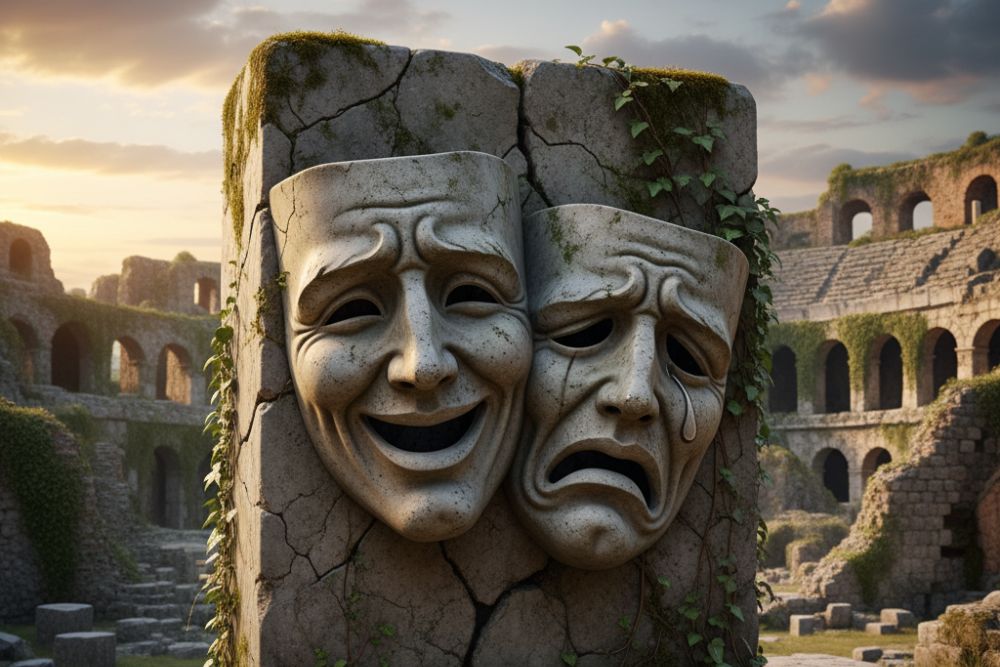
Read more: Healing Your Inner Child – 15 Steps to Unearthing the Happy, Healthy You Within
Practice “sufficient” asceticism (minimalism)
Take nothing for the journey except a staff – no bread, no bag, no money in your belts. Wear sandals but not an extra shirt.
Mark 6:8-9
How do you cultivate resilience for the involuntary uncertainty of life (like a health crisis or a job loss)? One way to do it, as I figured, is to practice voluntary uncertainty.
This ties directly back to my value of anti-materialism. Back in the day, some ancient philosophers, like Diogenes, took the idea to an extreme, living in a barrel and renouncing everything.
For my part, I don’t believe we need to go that far. Rather, one should learn to tread some kind of Middle Path.
The most practical way to do this is through minimalism.
When you declutter your home, you’re not just organizing your closet. You’re practicing detachment. For every item, you ask, “Can I live without this? Does this really make me happy?” You are proving to yourself that your identity is not tied to your possessions.
Another way is to practice small, voluntary discomforts. For example, many times, in the late evening, I’ll get that familiar pang of hunger. The “common sense” script, the certainty, immediately kicks in: “You are hungry. You must eat.”
But over time, I’ve learned to get curious.
Instead of just reacting, I’ll often decide not to eat and just… sit with the discomfort. I’ll observe it. Is it really hunger? Or is it boredom? Or just a habit?
That powerful feeling of “hunger,” which my mind registers as an objective fact, is often just a guess. And almost always, after a few minutes of just watching it, the “crisis” passes. The feeling fades.
I’ve just challenged a small, bodily “certainty” and realized I have the power to change my reality by simply not reacting.
I’ve embraced a moment of discomfort and proven to myself, once again, that I am not a slave to my impulses.
Every time you fast from a meal, take a cold shower, or sell something you don’t need, you are sending a message to your nervous system: “I can be uncomfortable, and I will be okay.”
You are building an inner fortress of resilience, one small, voluntary act at a time. This makes you far less afraid of the involuntary discomforts life will inevitably send your way.
Look well into thyself; there is a source of strength which will always spring up if thou wilt always look.
Marcus Aurelius

Embracing uncertainty
Adopt an action-oriented mindset
This is the precept by which I have lived: Prepare for the worst; expect the best; and take what comes.
Hannah Arendt
You cannot think your way out of uncertainty. You must act your way through it.
- Be flexible
As mentioned, our innate desire for certainty does serve a practical function. We need tools like KPIs, project deadlines, and personal commitments to organize our lives and collaborate.
The key is to see them as guides, not chains. A KPI is a tool to guide action, not a rigid, unbreakable law. Acknowledge that it’s based on a snapshot in time. When new information emerges, you have the flexibility to adapt.
“But what if my boss/ client demands a clear commitment?” I suppose some of you may be thinking that by now. In that case, instead of saying “I can’t” immediately, I believe we can reframe the situation by asking questions like:
“What are the most significant risks we need to account for?”
“What are the factors that could prevent us from meeting this goal?”
“Based on the information we have, what is the most likely outcome, and what is our plan if that changes?”
And if necessary, don’t be afraid to set boundaries – between what is realistically possible (your efforts to follow a plan) and what is not (an outcome that is subject to so many external variables).
This, to me, is a sign of maturity – of knowing, as the psychologist Alfred Adler referred to, how to “separate tasks”.
- Embrace the “probable” over the “certain”
This is a very important mindset shift, especially at work. Instead of demanding absolute certainty (a fallacy), it’s better to focus on what is probable.
You can’t guarantee a project will be done by May 1st. But you can define a high-probability outcome based on the data you have today.
- Focus on process, not outcomes
We’ve touched on this, but it’s the core of action. You can’t control if you get the job. Yet you can send five well-researched applications today – that is totally within your ability.
You can’t control whether your blog post goes viral. But you can control writing and publishing it. Value the effort.

- Devise alternatives
Never put all your emotional eggs in one basket. If your entire sense of self-worth is riding on one uncertain outcome (“I must get this promotion”), the fear will be paralyzing. A wise person would, instead, cultivate options.
“I’m applying for that promotion, but I’m also updating my portfolio for freelance work and setting up a coffee chat with an old colleague.”
This way, you reduce your dependence on any single outcome.
- Take small, low-stakes leaps
“Leap of faith” doesn’t have to mean quitting your job. You can practice every single day.
My friend who asks to borrow money? That’s a perfect small leap. I apply a simple rule: I only lend an amount I am fully prepared to consider a “gift.”
By accepting the worst-case scenario, I free myself to act out of generosity, not fear.
Try a new restaurant without reading 100 reviews. Take a different route home from work. These are the small reps that build the “faith” muscle.
- Act with informed conviction
This brings us back to the question I posed in the beginning – the one that haunted me when I first watched Indiana Jones: How could he possibly take that step? Was it just blind faith?
Looking back, I realize Indy’s leap wasn’t blind at all. He had reflected on the clues – his father’s diary, the pattern in the trials. His terror was real precisely because he acknowledged the risk.
His courage wasn’t in not being afraid; it was in taking the step despite that fear, based on an informed conviction that went beyond what his eyes could see.
Most of our leaps aren’t life-or-death like Indy’s. But the principle is the same. We gather what information we can, we reflect, we acknowledge the risk, and then we choose to act.
You don’t have to see the whole path. You just need to be willing to take the next step.
Faith is taking the first step even when you don’t see the whole staircase.
Martin Luther King Jr.

Embracing uncertainty
That being said, sometimes life does present us with truly agonizing dilemmas – where even after reflection, every path seems to lead to loss or violates a deeply held value.
For example, have you ever heard about the “Trolley Problem” thought experiment? A runaway trolley is heading down a track where five people are working and will be killed if nothing is done. You are a bystander next to a lever that can divert the trolley onto a different track. The second track has only one person working on it, who will be killed if you pull the lever. The question is: Do you pull the lever, sacrificing one person to save five?
No matter what you do, someone will die, and your action (or inaction) determines who it is.
Or, have you ever heard about the story of Uruguayan Air Force Flight 571 – where survivors stranded in the Andes were, due to starvation, forced to resort to cannibalism (specifically, eating the deceased) just to stay alive?
In these moments, there is no clean, “right” answer guaranteed by certainty. And that is when “informed conviction” takes on a much deeper meaning.
It means acknowledging the tragic nature of the choice, acting in alignment with your most fundamental values (even if imperfectly), and crucially, finding the inner resources – be it acceptance, faith, or self-compassion – to carry the unavoidable weight of that decision.
It requires us to act without the comfort of knowing we did the “perfect” thing, only that we did the best we could in an impossible situation.
It’s not easy, I know. In those moments, we must find a different kind of conviction – not faith in a guaranteed outcome, but in the principle of the action itself.
It’s the trust that acting with honesty, integrity, and compassion is, in itself, the only meaningful response, regardless of the consequences. In other words, “what you did” matters more than what people think.
It’s the conviction to be a “Standing Man” or “Standing Woman”, no matter how painful the choice is.
Morality resides in the painfulness of an indefinite questioning.
Simone de Beauvoir, ‘The Ethics of Ambiguity’
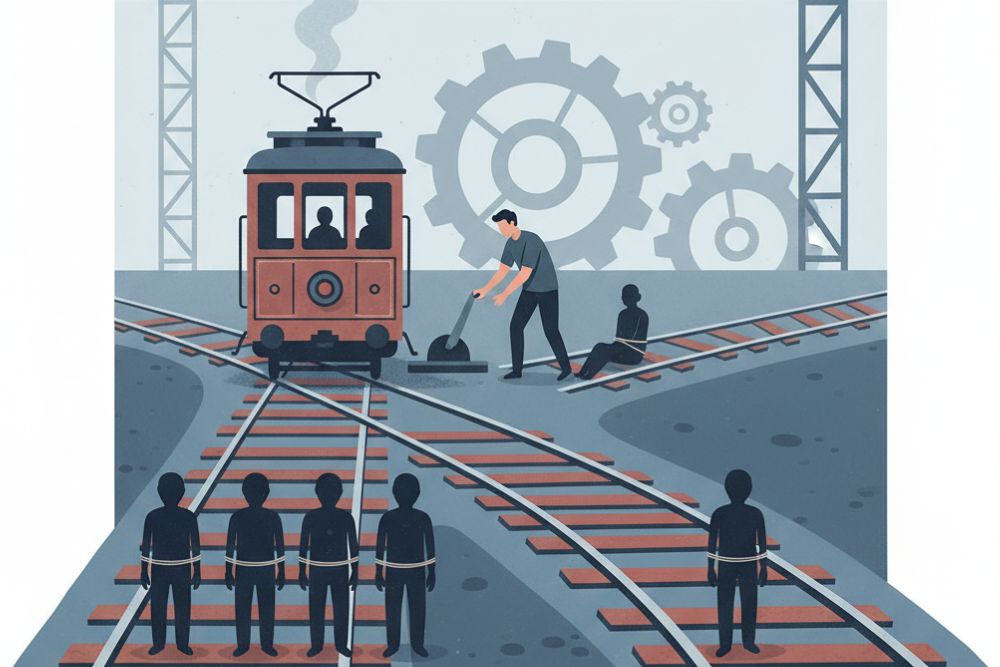
Think like a philosopher
I tore myself away from the safe comfort of certainties through my love for truth – and truth rewarded me.
Simone de Beauvoir
Embracing uncertainty is more than just coming up with a list of coping mechanisms; it requires a specific mindset: that of a philosopher. Not an academic professor, but a “lover of wisdom” in one’s daily life.
It starts, as Socrates and Confucius taught, with intellectual humility – the courageous admission that our understanding is always incomplete. That there is always a gap in our ability to comprehend phenomena vs that of the noumena itself.
When we think we “know” who we are, fixed and unchangeable, we shut the door to further growth.
When we admit “I do not know,” the possibility of truly knowing opens up.
Being a philosopher of your life means actively engaging with the world and yourself – by trying new things, regularly examining your inner world, and above all, always questioning. Questioning everything – including things typically regarded as “common sense” (e.g. ‘Why is the sky blue?’, ‘Why do we have to work?’) and even those that may seem ridiculous to the ordinary person (e.g. ‘What is right, and what is wrong?’).
Speaking of which, I remember once coming across a parable by the Chinese philosopher Zhuangzi:
Once upon a time, I dreamt I was a butterfly, fluttering hither and thither, to all intents and purposes a butterfly. I was conscious only of my happiness as a butterfly, unaware that I was myself. Soon I awaked, and there I was, veritably myself again. Now I do not know whether I was then a man dreaming I was a butterfly, or whether I am now a butterfly, dreaming I am a man.
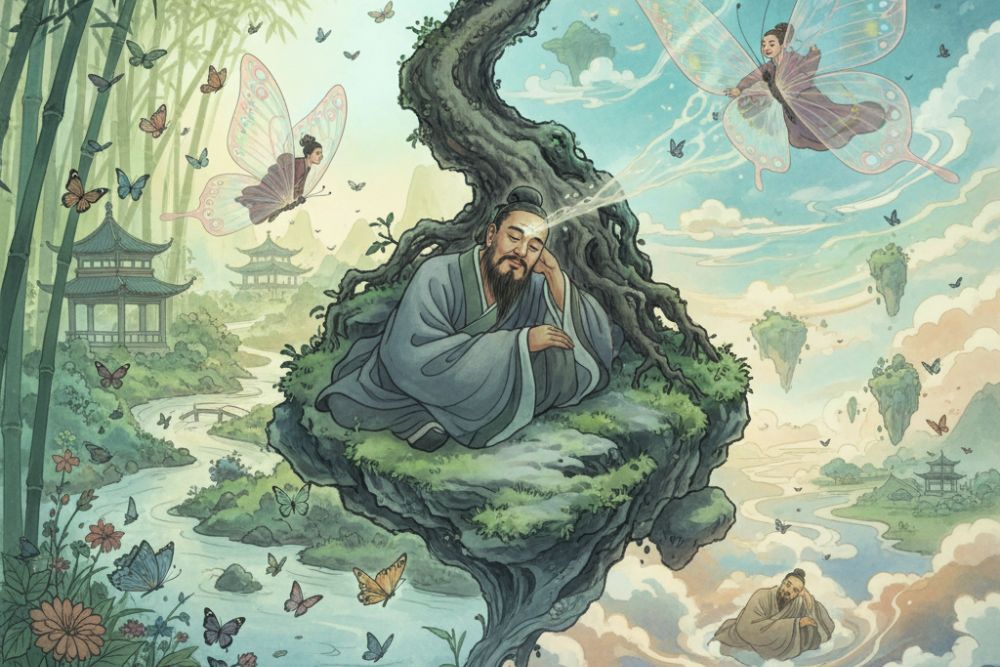
I suppose most people would dismiss such an idea as utterly nonsense. And yet for me, I somehow felt really captivated the first time I read it.
To me, such a mindset – one that dares to question the very certainty of reality itself – is exactly the foundation of philosophy. Of knowledge itself.
Remember the priest I mentioned above, who dismissed ideas like reincarnation with oversimplistic arguments? While my Christian background doesn’t align with reincarnation, simply holding it as a possibility – as a philosophical question rather than a threat – has made me arrive at profound reflections.
If there are no previous lives at all, then where was I before I was conceived?
If there wasn’t a ‘me,’ was it just… void? Or what? What was there?
Assuming that there’s an afterlife – either in heaven, hell or purgatory, as it is taught in mainstream Christianity – then why is my “lifespan” (including this life and the afterlife) much shorter compared to the ones who were born thousands/ millions of years ago?
There are no easy answers. But living with these questions – letting them sit there without demanding resolution – has been incredibly fruitful. Specifically, it fuels my humility, my curiosity to keep searching, and my empathy for others grappling with their own worries/ crises.
It is the mark of an educated mind to be able to entertain a thought without accepting it.
Attributed to Aristotle in Lowell L. Bennion, ‘Religion and the Pursuit of Truth‘
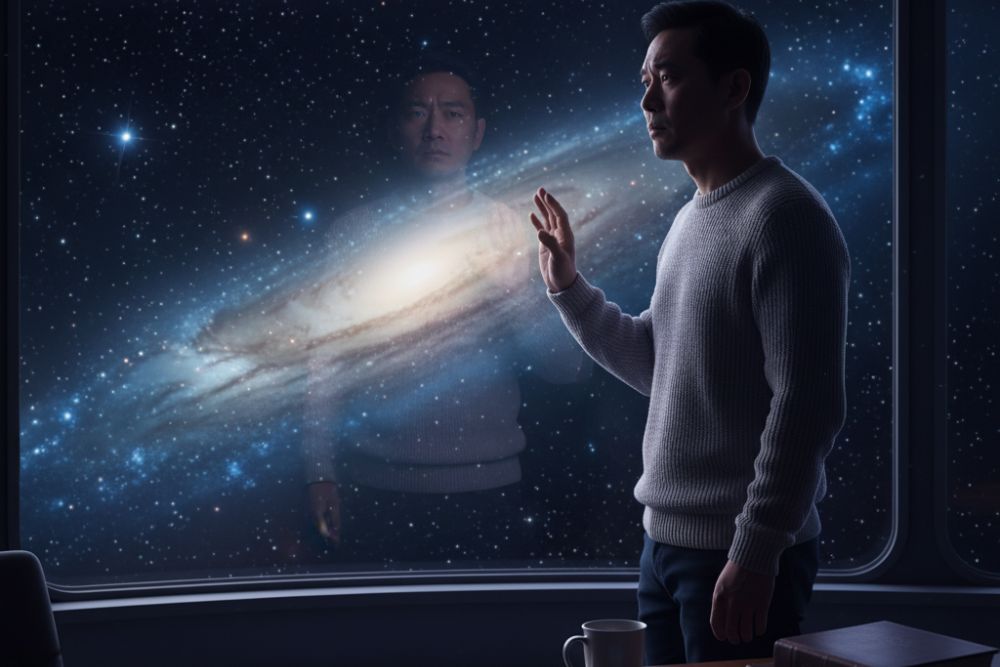
Embracing uncertainty
Now, some of you might be wondering: Doesn’t this deep philosophical questioning contradict the pragmatism of the Parable of the Poisoned Arrow we discussed earlier? Should we be pulling out the arrow of suffering, or getting lost in butterfly dreams?
I believe the answer is both. The key is context and balance.
The Poisoned Arrow teaches us crucial triage: when faced with urgent issues (our own or others’), endless speculation is a dangerous distraction. We must act.
But the “philosopher” mindset isn’t meant for moments of crisis. It’s for the quieter moments of reflection and seeking deeper insight.
It’s the practice that cultivates the wisdom, humility, and resilience needed to act effectively when the next arrow inevitably strikes.
Philosophical inquiry fuels our humility and expands our perspective, making us better at dealing with suffering when it arises.
It’s not about choosing one over the other; it’s about knowing when each is needed. Just as the Buddha has taught – treading the Middle Path.
There’s a time for daring and there’s a time for caution, and a wise man understands which is called for.
John Keating, ‘Dead Poets Society’ (1989)
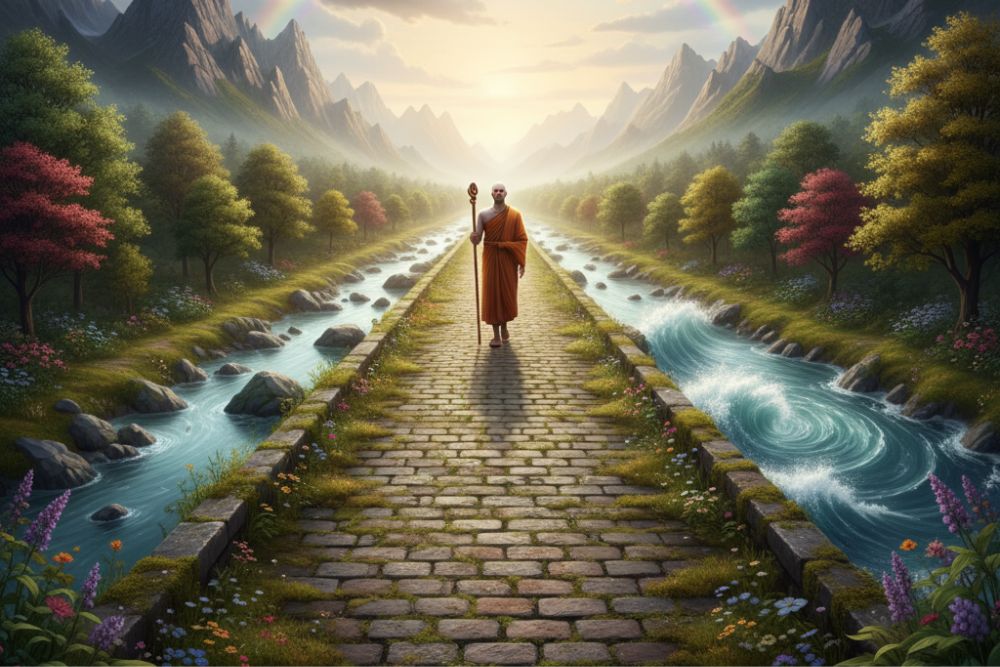
(As a side note, I would like to say – as I have pointed out in another article – that I do have enough life experiences to, at least, believe in the validity of teachings like reincarnation, even though I have not embraced it wholly as a truth yet. It remains, for me, a thought-provoking lens through which to explore life’s mysteries)
Reflect on your mortality
Your time is limited, so don’t waste it living someone else’s life.
Steve Jobs
Death, as we’ve discussed, is the only absolute certainty in life – though its exact timing is shrouded in mystery. While talking about death is naturally uncomfortable for most of us, contemplating it (‘Memento Mori,’ as the ancient Romans called it) might actually be the key to finding peace with all the uncertainty life throws at us.
Think about it. The fear of asking for that raise, the anxiety over whether a new project will succeed, the worry about what others think of us – how significant do these really feel when placed against the backdrop of our limited time here?
Contemplating mortality isn’t about being morbid; it’s about perspective. It’s a filter that helps us distinguish the truly important from the merely urgent or the ultimately trivial. It clarifies our values like nothing else.
After all, we can be submerged by death at any moment – any moment at all. There’s no guarantee that tomorrow will come.
When we truly let that sink in – not just intellectually, but feel it – the need to cling tightly to anything (possessions, status, knowledge, etc.) starts to dissolve. It forces an awakening, sharpening our senses, cutting through the noise of abstract debates and daily anxieties.
It becomes the ultimate motivation to stop sleepwalking and truly live.
Contemplating death doesn’t require us to do anything special at all. Just take a few brief moments each day and ask yourself:
“Knowing my time isn’t infinite, does this worry really matter?”
“What would I regret not doing if my time were shorter than I expect?”
While the practice doesn’t eliminate uncertainty, it DOES change our relationship to it. By accepting the ultimate unknown – the when and how of our end – we will find the courage to live more fully and authentically today, despite all of the messy things.
It shifts our focus from controlling the future to cherishing the present.
Ardently do today what must be done. Who knows? Tomorrow, death comes.
Buddha
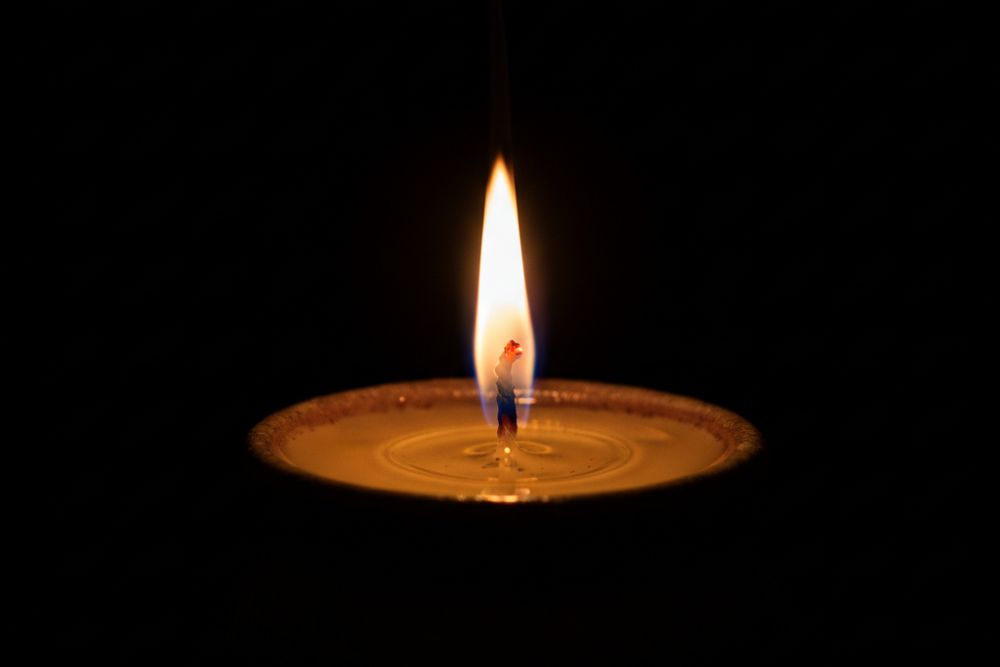
Embracing uncertainty
Learn to love & trust
You must understand that seeing is believing, but also know that believing is seeing.
Denis Waitley
By now, we have been talking about embracing uncertainty mostly as an internal practice. Now it’s time to turn it outward – to face the randomness often encountered in our relationships with other people.
We can’t control them. We can’t predict them. We can’t “solve” them. After all, as Dostoevsky once commented, “Man is a mystery.”
For many of us, our “default” mode – driven by fear – is to adopt a transactional approach:
“I will trust you if you prove you’re trustworthy.”
“I will love you if you meet my conditions.”
In other words, we demand guarantees before we’re willing to commit.
That is not love nor friendship at all. That is a calculation. And as we have discussed previously, a reward-based relationship will never last.
To love means to commit oneself without guarantee, to give oneself completely. Love is an act of faith, and whoever is of little faith is also of little love.
Erich Fromm
This, I’ve come to believe, is the ultimate practice for embracing uncertainty. It’s an active, passionate choice to show confidence – without condition.
It’s the decision to start first. To offer your trust without a guarantee of it being returned. To listen deeply to someone without knowing for sure that they will listen to you.
Why is it so vital? Isn’t it pure naivety? I myself don’t think so.
In fact, it’s the only way for relationships to work.
PHILOSOPHER: In what way can I get someone to receive and listen deeply to my words? I cannot force them and say, ‘Believe in me.’ That person is free to believe or not to believe. The only thing I can do is believe in the other party to whom I am speaking. That is all.
I want you to believe in me. So, I will believe in you first, even if you yourself are trying not to believe. I believe in you, whether you believe in me or not. I keep on believing. That is the meaning of unconditional.
Take, for example, when parents who do not have confidence in their children are worrying about various things. Even if their arguments are quite reasonable ones, they do not reach the children. Actually, the more reasonable the arguments are, the more the children want to oppose them. Why do they oppose them? Because their parents aren’t actually seeing them at all, and even as the parents are in the midst of distrusting themselves, the children are getting all the standard lectures.
YOUTH: But… Even if I believe in someone, there’s no way to know if that person will have confidence in me – or if that person will embark on a friend relationship with me!
PHILOSOPHER: This is the separation of tasks. How does that other person feel about you and what sort of attitude do they take towards you? Those are the other person’s tasks and are not something you have any control over.
Ichiro Kishimi, ‘The Courage to Be Happy’
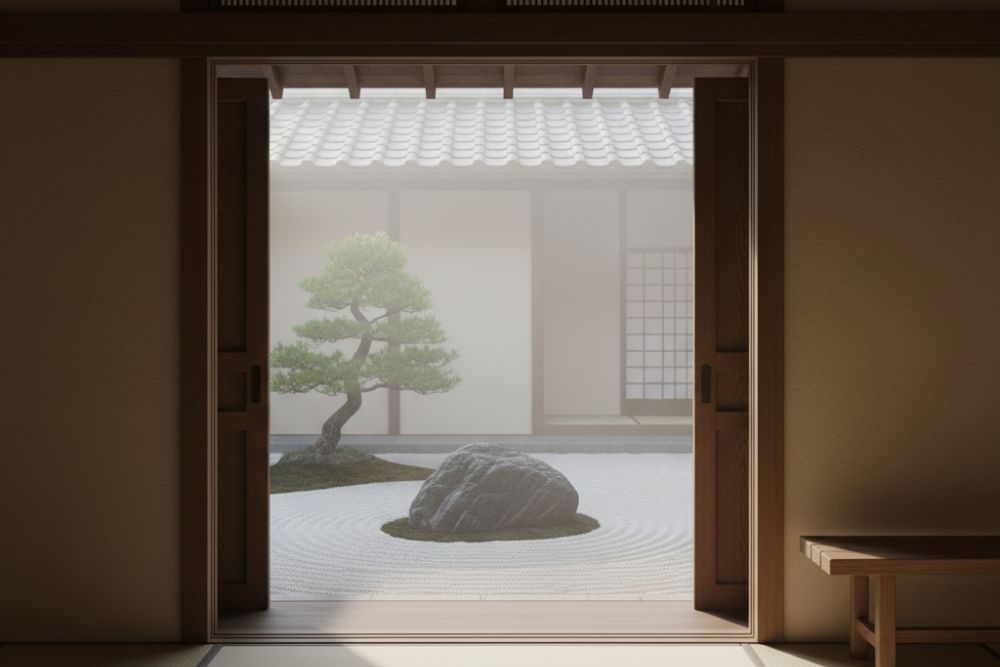
After all, human beings are not static creatures. They are always capable of changing. The workaholic husband who never spends time with his family now – there’s no guarantee that he cannot become a better husband in the future.
In the book Man’s Search for Meaning, Viktor Frankl mentions a story as follows:
Let me cite the case of Dr. J. He was the only man I ever encountered in my whole life whom I would dare to call a Mephistophelean being, a satanic figure. At that time he was generally called “the mass murderer of Steinhof” (the large mental hospital in Vienna). When the Nazis started their euthanasia program, he held all the strings in his hands and was so fanatic in the job assigned to him that he tried not to let one single psychotic individual escape the gas chamber.
After the war, when I came back to Vienna, I asked what had happened to Dr. J. “He had been imprisoned by the Russians in one of the isolation cells of Steinhof,” they told me. “The next day, however, the door of his cell stood open and Dr. J. was never seen again.” Later I was convinced that, like others, he had, with the help of his comrades, made his way to South America.
More recently, however, I was consulted by a former Austrian diplomat who had been imprisoned behind the Iron Curtain for many years, first in Siberia and then in the famous Lubianka prison in Moscow. While I was examining him neurologically, he suddenly asked me whether I happened to know Dr. J. After my affirmative reply, he continued:
“I made his acquaintance in Lubianka. There he died, at about the age of forty, from cancer of the urinary bladder. Before he died, however, he showed himself to be the best comrade you can imagine! He gave consolation to everybody. He lived up to the highest conceivable moral standard. He was the best friend I ever met during my long years in prison!”
This is the story of Dr. J., “the mass murderer of Steinhof.” How can we dare to predict the behavior of man? We may predict the movements of a machine, of an automaton; more than this, we may even try to predict the mechanisms or “dynamisms” of the human psyche as well. But man is more than psyche.
If a man like Dr. J. can hold the potential for such a profound transformation, then anyone can.
In other words, no person is a fixed “fact.” Everyone is an unfolding mystery.
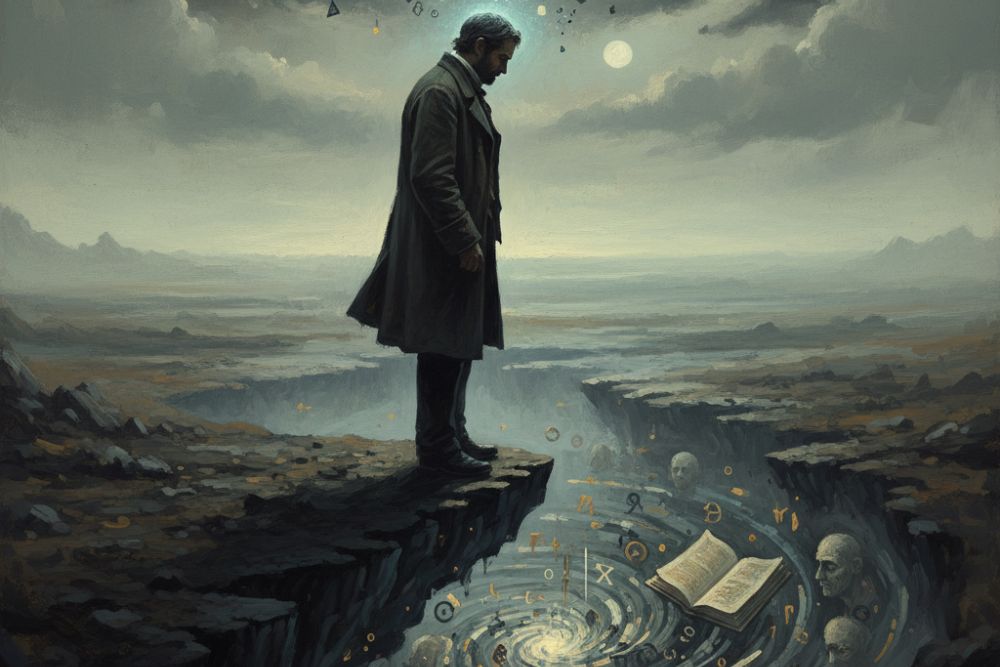
Embracing life’s uncertainty
We know that – intuitively and empirically – and yet far too often, we refuse to accept it. Just like the father with the bag of ashes, our tendency is to be obsessed with a “certainty” about others (e.g. “that person is toxic,” “my boss is a jerk,” “that family member will never change”). Especially when it comes to those in our inner circles – to our most intimate relationships every single day.
The renowned executive coach Marshall Goldsmith once shared a story about this in his bestseller The Earned Life.
10 years ago, I began coaching an executive. Let’s call him Mike. His natural leadership skills set him apart from the standard C-suite issue of smart, motivated, underpromise-and-overdeliver types. But he had some rough edges that needed smoothing.
Insensitive, rarely wrong, and entitled. These were issues that came up in my 360-degree reviews with his colleagues and direct reports, which I shared with him. He accepted the criticism with grace, and in less than two years changed his behavior to his own satisfaction and, more important, in the opinion of his peers.
We remained friends after he became CEO, talking at least once a month about his job and, increasingly, about his family life. He and his wife – college sweethearts – had four grown kids, all out of the house and on their own. The marriage was solid after years of tension when Mike was focused on his career while his wife, Sherry, raised the kids and built up a seemingly unshakable resentment of Mike’s self-absorption and insensitivity.
“Is Sherry wrong?” I asked, pointing out that if he had been perceived as insensitive and entitled at work, he probably was the same at home.
“But I’ve changed,” he said. “She’s even admitted it. And we’re much happier. Why won’t she let it go?”
I explained the Every Breath Paradigm to him, stressing how hard it was for Westerners to conceive that we are not a unitary mass of flesh and bone and emotions and memories, but rather a steadily expanding multitude of individuals, each one time-stamped in the moment of our most recent breath – and reborn with every breath.
I told Mike, “When your wife thinks about her marriage, she can’t separate the previous Mike from the man who is her husband today. They’re one character to her, a permanent persona. It’s how we all think if we’re not careful.”
Mike struggled with the concept. He couldn’t think of himself as a running series of many Mikes, a new one nearly eight million times a year (the estimated number of breaths we take annually). It collided with his fixed self-image of the impressive, successful Mike that he projected to the world.
We still talk regularly and he’s still a CEO. But in the summer of 2019 he called me out of the blue, excitedly announcing, “I got it!”
I had no idea what he was talking about, but it soon became clear the “it” was about our Every Breath talks.
He described a conversation he’d had the day before with Sherry. They were driving back from a Fourth of July reunion at their weekend home with the kids and their partners and friends. It was a crowded but joyous weekend, and Mike and Sherry were reliving the high points on the two-hour drive, pleased at how the children turned out, how engaging and helpful their friends were, how the kids did most of the cooking and cleaning up. Basically, they were congratulating themselves on their good fortune and their successful parenting.
Then Sherry threw a wet blanket on their reverie.
“I just wish you had contributed more when they were growing up,” she said. “I was so alone most of the time.”
“I wasn’t hurt by her words, or angry,” Mike told me. “I turned to her and very calmly said,
‘You’re right about that guy ten years ago. He was clueless about many things. But that’s not the guy in this car right now. He’s a better man now. Tomorrow he’s going to be someone else trying to be a little better. Another thing – that woman who suffered back then is not the same woman today. You’re faulting me for the actions of someone who doesn’t exist anymore. It’s not right.’”
The car was silent for a long ten seconds. Then Sherry apologized, adding, “You’re right. I have to work on that.”
Think about it. How often do we, like Sherry, cling to our past understanding of someone – a partner, a parent, a friend – based on their old mistakes? How many times do we hold onto the “ashes” of who they were, blinding ourselves to the real, living person who is breathing in front of us?
Embracing uncertainty – especially in the context of relationships – means granting others (and ourselves!) the grace to evolve. It means being willing to let go of our fixed stories about them – and engage with who they are in this moment. To love, to trust, to see the potential in everyone.
This, I believe, is the final, most transformative leap. It is the ultimate acceptance of life’s “delicious ambiguity.”
Man is always something more than what he knows of himself. He is not what he is simply once and for all, but is a process; he is not merely an extant life, but is, within that life, endowed with possibilities through the freedom he possesses to make of himself what he will by the activities on which he decides.
Karl Jaspers
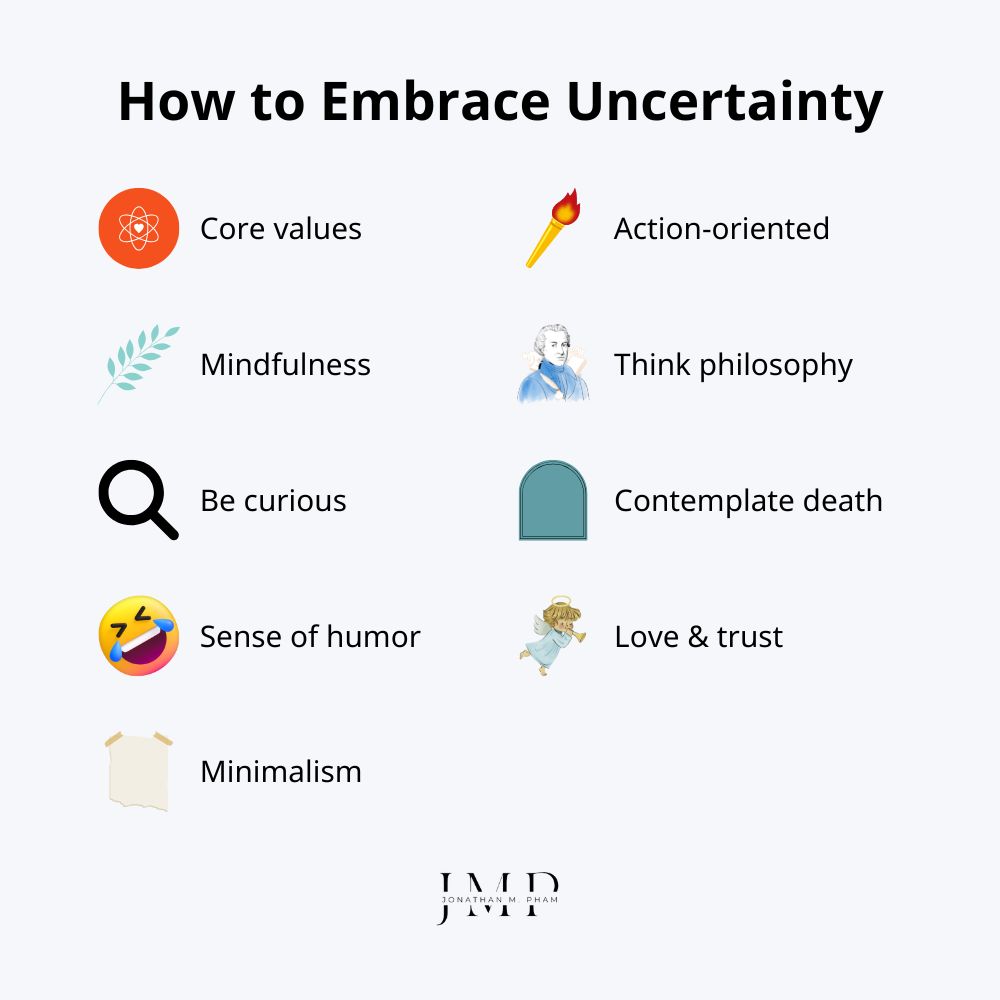
Embracing uncertainty
Read more: 40 Spiritual Lessons – Wisdom for Life’s Journey
Embracing Uncertainty Quotes
Check out more quotes about uncertainty here!
Books about Embracing Uncertainty
| Title / Creator | Core Theme & Connection to Uncertainty | Primary Focus |
| The Wisdom of Insecurity – by Alan W. Watts | The relentless search for security/certainty is the root of anxiety. True peace arises from embracing the present moment and the inherent “groundlessness” of existence. | Spiritual / Philosophy / Mindfulness |
| When Things Fall Apart – by Pema Chödrön | Buddhist wisdom on finding courage and compassion not by escaping chaos, but by leaning into the discomfort and embracing the “fundamental groundlessness of being human.” | Spiritual / Buddhism / Resilience |
| Zen Mind, Beginner’s Mind – by Shunryu Suzuki | The power of the “beginner’s mind” (shoshin/ 初心) – an attitude of openness, curiosity, and lack of preconceptions – as essential for experiencing reality and navigating uncertainty without judgment. | Spiritual / Zen / Mindfulness |
| Man’s Search for Meaning – by Viktor Frankl | A timeless read on how to find meaning, purpose, and inner freedom by choosing one’s attitude, even amidst horrific suffering and total uncertainty. | Existential / Psychology / Resilience |
| The Myth of Sisyphus – by Albert Camus | A foundational text of Absurdism, which argues for confronting the conflict between our desire for meaning and the universe’s silent indifference. Embracing the “absurd” allows for revolt, freedom, and passion in an indifferent world. | Philosophy / Absurdism |
| Be Here Now – by Ram Dass | A counter-culture classic encouraging a shift from future-oriented anxiety and past regrets to deep awareness and acceptance of the present moment. | Spiritual / New Age / Mindfulness |
| Feel the Fear and Do It Anyway – by Susan Jeffers | Fear is an unavoidable part of stepping into the unknown; courage comes from acting despite the fear, not waiting for it to disappear. | Self-Help / Psychology / Action |
| Embracing Uncertainty – by Susan Jeffers | Actionable tools and mindset shifts to transform the anxiety of “what-ifs” into excitement about possibilities. | Self-Help / Practical |
| The Power of Now – by Eckhart Tolle | Psychological suffering arises from attachment to the past and the future. Liberation comes from intense presence and accepting the uncertainty of the “now.” | Spiritual / Mindfulness |
| Meditations – by Marcus Aurelius | The personal reflections of a Roman emperor on Stoic principles, emphasizing acceptance of fate (Amor Fati), inner virtue, and acting rationally amidst external chaos. | Philosophy / Stoicism / Resilience |
Read more: 20 Best Self-discovery Books to Find Your North Star
Movies & Watches on Uncertainty
| Title / Year | Core Theme & Connection to Uncertainty | Primary Focus |
| The Secret Life of Walter Mitty (2013) | A timid man is jolted from his predictable routine into a global adventure, discovering that embracing spontaneity and the unknown is the key to a vibrant, meaningful life. | Adventure / Self-discovery |
| Life of Pi (2012) | Facing extreme uncertainty and loss at sea, a young man relies on faith, storytelling, and resilience to survive. Questioning the nature of reality and belief. | Faith & Survival / Spiritual / Metaphor |
| Everything Everywhere All at Once (2022) | Overwhelmed by infinite possibilities (radical uncertainty), the protagonist ultimately discovers meaning and power not in controlling chaos, but in choosing love and acceptance within her present, imperfect reality. | Modern Chaos / Meaning of Life / Family |
| A Serious Man (2009) | A dark comedy portraying a man whose life unravels inexplicably, forcing him (and the audience) to confront the seemingly random and absurd nature of suffering and existence. | Existential / Absurdism / Dark Comedy |
| Into the Wild (2007) | A young man rejects societal certainty and material comfort to seek authenticity and freedom in the wilderness. | Existential / Nature / Tragedy |
| Spring, Summer, Fall, Winter… and Spring (2003) | A contemplative film set in a floating monastery, illustrating the inescapable cycles of life, desire, suffering, and renewal, urging acceptance of life’s flow. | Contemplative / Buddhism / Impermanence |
| Lost in Translation (2003) | Two characters adrift in a foreign culture find solace in a shared sense of disorientation and connection. | Connection / Ambiguity / Mood |
| Groundhog Day (1993) | Trapped in a loop of absolute certainty (repeating the same day), a cynical man must learn to embrace the present moment, cultivate virtue, and find meaning not by escaping the loop, but by transforming within it. | Comedy / Existential / Growth |
| Silence (2016) | Grappling with doubt, the nature of faith in the absence of certainty, and finding meaning amidst perceived divine silence. | Spiritual / Existential / Faith |
| 12 Angry Men (1957) | The fallibility of perception, the importance of questioning assumptions, and the moral weight of making judgments under uncertainty. | Justice System / Psychology / Doubt/ Moral Dilemma |
Further Readings on the Theme of Embracing Uncertainty
Embracing Uncertainty – by Maja Wrzesien Ph.D. https://www.psychologytoday.com/us/blog/psychological-science-bites/202509/embracing-uncertainty
Philosophy for Plain People. https://archive.philosophersmag.com/philosophy-for-plain-people/
Uncertainty – The Philosophical Problem of Our Time. https://archive.philosophersmag.com/uncertainty-the-philosophical-problem-of-our-time/
Are These Bad Times or Good Times? The Story of the Zen Farmer. https://mindfulness.com/mindful-living/are-these-bad-times-or-good-times-the-story-of-the-zen-farmer
Two Men Climb Down a Chimney. https://stephenpersing.wordpress.com/2015/07/03/two-men-climb-down-a-chimney/
Rowling’s Life as an Author: What It Was Really Like to Write Harry Potter. https://thefriendlyeditor.com/2015/06/16/rowling-writing-harry-potter/
TED Talk on embracing uncertainty
Final Thoughts
It’s been over two years since I stood at the edge of my own chasm and quit my full-time job. I leaped.
And as of now, I can tell you that the “nothingness” I was so afraid of wasn’t an empty void at all. It was just an open space, waiting to be filled.
When I look back, so many of the choices that have brought me the most peace made no “rational” sense. For example, there was no spreadsheet that could justify my decision to start learning Japanese, a language for which I had no immediate career goal.
I had to rationalize it to others, of course, but deep down, I just felt a pull – an intuition, a “mystical” feeling that this was my path.
After all this stumbling, reflecting, and “walking,” I can’t point to a massive bank account or a linear, “certain” path to success. The fog hasn’t magically disappeared.
But I can tell you this: I feel happy. I feel content. I feel authentic.
That feeling, right there, has been enough to justify the entire leap.
This is the real “house on the rock.” Not wealth, status, or what society often treasures – but the inner peace you build by anchoring yourself in your values, rather than your expectations.
It’s the shift from a life built on a wager of fear to one built on a commitment of love – love for the process, love for the truth, and love for being you yourself.
Embracing uncertainty isn’t a sign of recklessness. It’s when one learns to let go of the illusion of control. To accept that we’re all just “peaches” – doing our best to guide and nurture our lives, rather than trying to force them to be “apples.”
In the end, we’re all standing at that chasm. We all have to live in an unpredictable world. The only absolute certainty we have is that our time here is finite.
We can spend that precious, limited time frozen at the edge. Or we can look out at the unknown, smile, and take the step.
We can choose to truly live while we’re still here.
I donʼt know if we each have a destiny, or if weʼre all just floating around accidental-like on a breeze, but I, I think maybe itʼs both. Maybe both is happening at the same time.
Forrest Gump (1994)

Embracing uncertainty
The Feather Theme – by Alan Silvestri
Let it Be – by the Beatles
Into the West – by Annie Lennox
Other resources you may be interested in:
- Shikata ga nai (仕方がない): Finding Serenity in Acceptance
- Gaman (我慢): The Unspoken Power of Japanese Endurance
- How to Earn Your Life: Finding Purpose Beyond Achievement
Let’s Tread the Path Together, Shall We?


